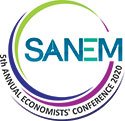The following biographies have been arranged in alphabetical order of the surnames
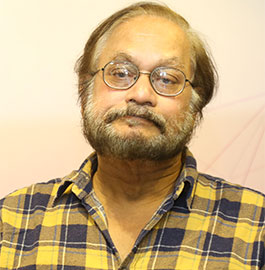
Dr. Shapan Adnan
Professional Research Associate
School of Oriental and African Studies (SOAS), University of London
Dr. Shapan Adnan is a Professorial Research Associate at School of Oriental and African Studies (SOAS), University of London.
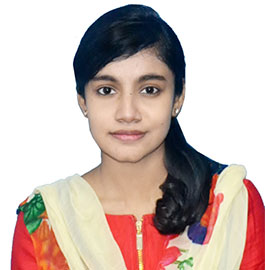
Anuva Afsana
Department of Economics
University of Dhaka, Bangladesh
Anuva Afsana is a student of Masters of Social Science at the Department of Economics, University of Dhaka, Bangladesh. The objective of her career is to join the academic sector. She is very much interested in working in the development sector and doing research so that she can contribute to bring some positive changes. Till this period she has some small achievements. A paper co-authored by her titled “Determinants of Methane Emission in Bangladesh using Environmental Kuznets Curve Analysis: ARDL Bounds Testing Approach” became champion of paper presentation competition on 2nd Bangladesh Economics Summit 2019 organized by Economics Study Centre, University of Dhaka. In year 2019, she presented her research paper on theme informal economy at the 15th South Asian Economics Students’ Meet (SAESM), Colombo, Sri Lanka. She is highly interested in extra curriculum activities. Currently she is working as the President of Sufia Kamal Debating Club, University of Dhaka and she worked as the Vice President of Economics Cultural Club, University of Dhaka. She also worked as a volunteer at 14th South Asian Economics Students’ Meet (SAESM).
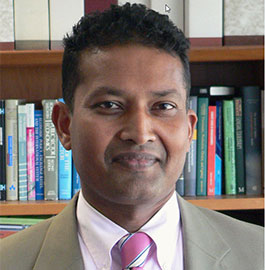
Dr. Helal Ahammad
Professor
Department of Economics
North South University, Bangladesh
Dr. Helal Ahammad has specialised in program leadership and collaborative project management in both academic and government settings, as well as providing technical and policy advice to a range of stakeholders. He was a Lead Author of the Fifth Assessment Report of Working Group III of the Intergovernmental Panel on Climate Change (IPCC): Climate Change 2014: Mitigation of Climate Change. During 2015-17, as an International Consultant, he successfully led and delivered an economic study on the Bangladesh ship recycling industry, jointly commissioned by the UN International Maritime Organization and the Government of the People’s Republic of Bangladesh, with financial support from the Norwegian Agency for Development Corporation. Dr. Ahammad worked for the Australian (federal) Government for about 15 years in various senior executive positions; provided strategic leadership for a number of research programs of the Australian Bureau of Agricultural and Resource Economics and Sciences and also contributed to the development of the Australian Government’s climate change response policies. Between 1987 and 2001, Dr Ahammad held teaching and research positions at the University of Rajshahi, the Australian National University, and the University of Western Australia. He is an Associate with the Australian National University’s Centre for Climate Economics and Policy. Dr Ahammad has published in reputable refereed journals including Agricultural Economics, Australasian Journal of Regional Studies, Economic Modelling, Energy Economics, Global Change Biology, Proceedings of the National Academy of Science, Resources Policy and Review of Urban and Regional Development Studies. He has published a book on the Bangladesh economy: Foreign Exchange and Trade Policy Issues in a Developing Economy: the Case of Bangladesh.
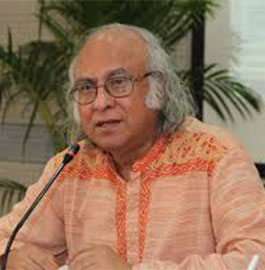
Dr. Qazi Kholiquzzaman Ahmad
Chairman
Palli Karma-Sahayak Foundation (PKSF), Bangladesh
Dr. Qazi Kholiquzzaman Ahmad is Chairman at Dhaka School of Economics (DScE) and also Chairman of Palli Karma-Sahayak Foundation (PKSF). He is also the Coordinator of the Bangladesh Climate Change Negotiating Team since 2009. A participant in the Bangladesh War of Liberation in 1971, he worked in the Planning Cell of the then Bangladesh Government-in-exile. He has been elected President of Bangladesh Economic Association (BEA) for three consecutive years (2002-2010).He represented Bangladesh at the UN Open Working Group (OWG) on Sustainable Development Goals (SDGs), having earlier played a key role in providing Bangladesh inputs on SDGs to the UN.He was a Member of the UNFCCC Clean Development Mechanism (CDM) Executive Board (2009-2014). He was a Coordinating Lead/Lead Author of the Intergovernmental Panel on Climate Change (IPCC)-Third and Fourth Assessments. In a career spanning over five decades, he has extensively participated in research activities and dialogues, nationally and internationally, covering various social, political, economic, water, and environmental/climate change aspects and issues of sustainable development as they relate to Bangladesh and other developing countries. Dr. Ahmad has to his credit a wide range of research works and publications (including authored/co-authored/edited/co-edited 38 books and over 250 articles/research reports and papers), at home and abroad. He edits or is a member of the Editorial Board of several national and international journals.
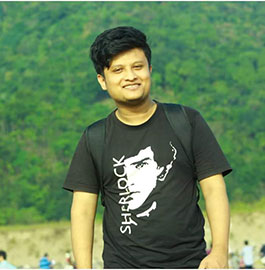
Sheikh Rafi Ahmed
Department of Economics
University of Dhaka, Bangladesh
Sheikh Rafi Ahmed is a 4th year student of Bachelor of Social Sciences in Department of Economics, University of Dhaka. He is an acclaimed debater and is currently a member of Group of Debaters, University of Dhaka. He has also played the role of tournament director in several prestigious debate tournaments with great success. He is currently working as the Public Relations Secretary at economics Study Center, University of Dhaka.
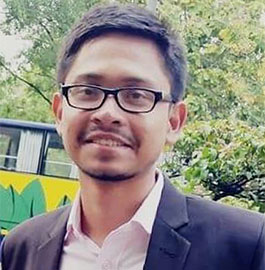
Shahriar Ahmed
Department of Economics
University of Dhaka, Bangladesh
Shahriar Ahmed is a student of Masters of Social Science at the Department of Economics, University of Dhaka, Bangladesh. He is an acclaimed debater of Dhaka University Debating Society. He became the champion in the UGC Inter University Debate Competition in 2017 and 13th Nafia Gazi Inter Department Debate Competition in 2018. He also became the 2nd runner up of UIU Minds of Society in 2017 and EconProdigy 3.0 hosted by NSU-YEF in 2017. He became the championof Econthon- “An inter university Economic Competition” organized by United International University (UIU) in 2018. He represented Team Bangladesh in both the 14th and the 15th South Asian Economics Students’ Meet
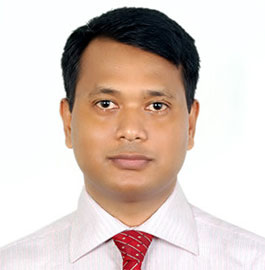
Dr. Abu Nur Rashed Ahmed
Additional Commissioner
Custom Bond Commissionerate
Dhaka, Bangladesh
Dr. Abu Nur Rashed Ahmed is the Additional Commissioner of the Customs Bond Commissionerate, Dhaka.
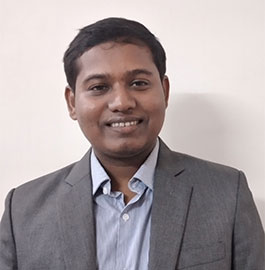
Md. Tuhin Ahmed
Research Associate
SANEM, Bangladesh
Md. Tuhin Ahmed is a Research Associate at South Asian Network on Economic Modeling (SANEM). He completed his Masters and Bachelors in Economics from University of Dhaka, Bangladesh. His research interest includes international trade, environment and climate change, labor economics and poverty & inequality. He has recently worked on a project: Drafting the Technical Framework for the 8th Five Year Plan (FY2021-2025) of Bangladesh, financed by General Economics Division (GED), Planning Commission, Ministry of Planning, Bangladesh. The study aims at constructing the Technical Framework for the 8th Five Year Plan in order to project consistent macro and micro level outcomes which is pertinent to the plan formulation. He is currently working on a project: Regional Investments and Value Chains Survey in South Asia, financed by The World Bank, USA. The survey aims at identifying the firm’s engagement in regional value chain and supply chain and looking at the role of culture, information networks, and South Asian relationships influencing business decisions and operations.
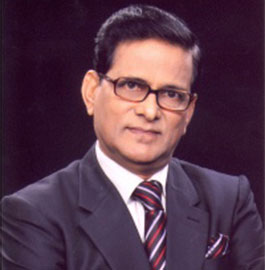
Dr. Shamsul Alam
Member (Senior Secretary)
General Economics Division, Bangladesh
Dr. Shamsul Alam, Member (Senior Secretary), General Economics Division (GED), Bangladesh Planning Commission has been serving the Government of Bangladesh over the last 8 years and a half. Prior to joining GED, Bangladesh Planning Commission, he was a faculty of Bangladesh Agricultural University from 1974 to 2009. Dr. Alam also worked for UNDP/FAO as a National Consultant for 4 years and 3 months. He served as a visiting Professor at Humbolt University, Germany, University of Ghent, Belgium and at the School of Development Economics, Wageningen University, Netherlands as an Erasmus Mundus Scholar. Dr. Alam coordinated the preparation of the first Perspective Plan of Bangladesh 2010-21 and Sixth & Seventh Five Year Plans of Bangladesh. He is currently coordinating the preparation of the Bangladesh Delta Plan 2100 and the Bangladesh Perspective Plan 2021-41. He has in his credit published 48 scientific articles in peer-reviewed national and international journals and authored ten Books. Dr. Alam travelled 45 countries of the World in connection with academic Seminars/Symposia as a government delegate.
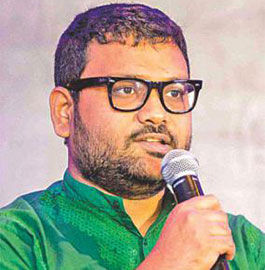
Farzeen Ferdous Alam
Founder
Oggro Venture, Ferdous Biotech
Farzeen Ferdous Alam is an award-winning economist turned farmer who started Oggro Ventures while in high school and now has acquired over 10 years of experience in the social enterprise sector by combining his experience in the development and business sector. An undergraduate of Economics from the University of Dhaka, Farzeen has worked on a number of issues ranging from rights of disabled persons to HIV/Aids awareness and has worked with international organizations such as the United Nations Alliance of Civilizations (UNAoC).
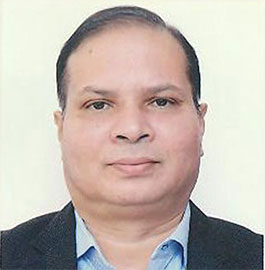
Dr. S. M. Zulfiqar Ali
Senior Research Fellow
Bangladesh Institute of Development Studies (BIDS), Bangladesh
Dr. S. M. Zulfiqar Ali is currently working as a senior research fellow at Bangladesh Institute of Development Studies (BIDS). Dr. Ali obtained his Ph.D. in Applied Economics from the University of Bath, UK in 1998. He also completed the Advanced Training Program (which is M.Phil equivalent) in Economics and Quantitative Techniques from BIDS in 1991. Earlier, he obtained B.Sc. (Hons.) and M.Sc. in Economics from Jahangirnagar University in 1989 and 1990 respectively. Later, he completed a course on "Economic Theory and Poverty Reduction: Theory, Empirical Evidence and Implication for South Asia" organised by the World Bank Institute in 1998, and another course on "Human Development: From Theory to Practice" from the Queen Elizabeth House of the University of Oxford in 2000. He joined BIDS in 1992 as Research Associate and was promoted to the position of Senior Research Fellow in 2010. He has published in both nationally and internationally accredited journals. He has also contributed to several edited volumes. His areas of interest include growth, inequality and poverty; human and social development; human wellbeing; applied economics; food security; natural resources and environmental economics; and climate change.
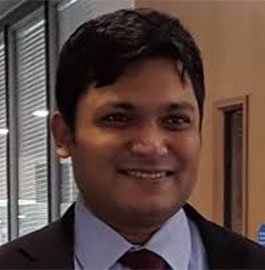
Dr. Sakib Bin Amin
Associate Professor
Department of Economics
North South University, Bangladesh
Dr. Sakib Bin Amin is an Associate Professor of the School of Business and Economics at North South University in Dhaka, Bangladesh whose research areas focus on Macroeconomics, Dynamic Stochastic General Equilibrium Modeling, Energy Economy and Tourism Economy. Dr. Sakib completed his PhD in Economics at Durham University Business School in 2015. His PhD thesis was concentrated on the Macroeconomics of Energy Price Shocks and Electricity Market Reforms in Bangladesh. During his stay at the United Kingdom, Dr. Sakib received the prestigious fellowship of the Higher Education Academy (HEA), an international recognition which is only awarded to professionals who meet the appropriate standards in teaching and supporting learning in higher education under the UK Professional Standards Framework (UKPSF). Dr. Sakib is also a fellow of OPEC Fund for International Development (OFID), a member of International Association for Energy Economics (IAEE) and a life member of Bangladesh Economic Association (BEA). Dr. Sakib received his bachelors’ and masters’ degrees in Economics from Dhaka University in 2002 and 2003 respectively. He also holds a masters’ degree in International Economics from the University of Essex in 2008. Dr. Sakib was invited to represent Bangladesh as a Young Economist at the 4th Nobel Laureate Meetings in Economic Sciences, held in Lindau, Germany in 2011. He was invited as a Keynote Speaker in the Eurasia II International Tourism Congress, 2016 held on 05-07 May, 2016, Konya, Turkey. Dr. Sakib has published over twenty journal articles in different peer reviewed local and international journals. He has successfully presented his PhD thesis results in a number of international conferences in addition to participating and presenting papers in different local and international conferences.
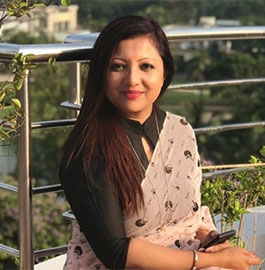
Nusrat Nahid Babi
Private Sector Specialist
World Bank Group
Nusrat Nahid Babi is currently serving as a Private Sector Specialist in World Bank Group. She has been working for 16 years in private sector development and project management in multicultural environment. She has vast experience in trade facilitation, trade logistic, trade policy, and investment climate. She has Regional experience in South Asia, South-East Asia and Africa, in depth knowledge and application of Making Markets Work for the Poor (M4P) and value chain approach, Financial Planning and Monitoring and many more. Prior joining the World Bank Group she worked as an Advisor in Traidcraft Exchange. Ms. Babi also works for Swisscontact- Katalyst as Group Manager.
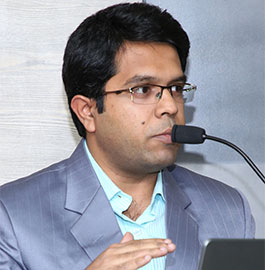
Suvajit Banerjee
PhD Scholar
Department of Politics and Economics
Visva Bharati University, India
Suvajit Banerjee is a senior PhD researcher at the Department of Politics and Economics, Visva Bharati University, West Bengal, India. He received his M.Sc. in Economics from the University of Kalyani. His broad research interest lies in Macro Economics, International Trade, and Environmental Economics. His paper received the ‘Best Paper Award – Third Prize’ at the 6th IIFT Conference 2018. He has two single-authored publications in a peer-reviewed journal ‘Foreign Trade Review’.
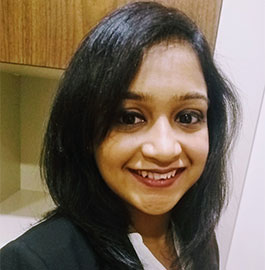
Anwesha Basu
PhD Scholar
Indira Gandhi Institute of Development Research (IGIDR), India
Anwesha Basu is currently pursuing her PhD in Economics from Indira Gandhi Institute of Development Research (IGIDR), Mumbai, India. She obtained her Bachelor’s degree in Economics from Jadavpur University, Kolkata and a Masters degree in Economics from Delhi School of Economics. Her areas of interest include International Trade, Development Economics and Applied Econometrics.
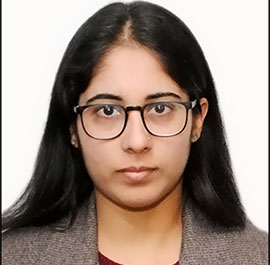
Shelja Bhatia
PhD Scholar
Centre for Development Studies
Jawaharlal Nehru University, India
Shelja Bhatia is currently a PhD student at Centre for Development Studies, Trivandrum. She completed her M.Phil. in Applied Economics in June, 2019 from Centre for Development Studies under the supervision of Dr. Parameswaran M. and Dr. Srikanta Kundu, who are Associate Professor and Assistant Professor respectively. Her research Interest broadly includes macroeconomics and monetary economics. She proposes to study the capital of commercial banks and business cycles for her PhD and currently reading the related literature. Ms. Shelja Bhatia completed her MA in Economics from Centre for Economic Studies and Planning, Jawaharlal Nehru University, New Delhi in 2017.
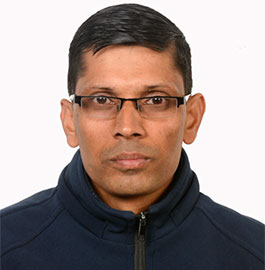
Kumar Bhattarai
Lecturer
Department of Economics
Tribhuvan University, Nepal
Kumar Bhattarari is a Lecturer of Economics at Tribhuvan University, Kathmandu, Nepal. He is also affiliated with Intensive Study and Research Centre (ISRC) as Consultant Economist. His research covers a wide range of areas within economics, including development economics, public finance international trade and environmental economics. I am awarded with a number of research grants. His works have been published in a number of indexed journals. He has also published a book entitled ‘Research Methods in Economics’. He is associate editor of ‘Economic Journal of Development Issues’. He received M.A. in economics from Tribhuvan University and he isPh. D. candidate on Nepalese Fiscal Federalism from Tribhuvan University, Nepal.
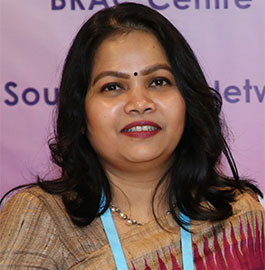
Dr. Sayema Haque Bidisha
Research Director, SANEM and
Professor, Department of Economics
University of Dhaka, Bangladesh
Dr. Sayema Haque Bidisha is Professor at the Department of Economics, University of Dhaka and Research Director of South Asian Network on Economic Modeling (SANEM). She received her Bachelor’s as well as Master’s from the Department of Economics, University of Dhaka. She obtained a Masters from the University of Bath and earned her PhD in Economics from the University of Nottingham. Her research interest lies in development economics, labour economics and environmental economics. She worked for the Planning Commission of the Government of Bangladesh and was closely involved in drafting the Five Year Plans of Bangladesh. She has completed a number of research projects on food security, rural credit, poverty, women empowerment in particular. She published a number of articles in peer-reviewed journals and also contributed in several book chapters and research reports. Dr. Haque also worked with different international organizations like the World Bank, FAO, IDRC, ILO etc.
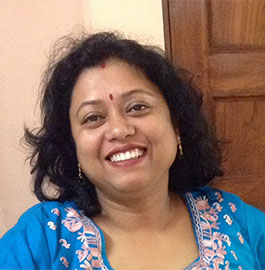
Dr. Saswati Chaudhuri
Associate Professor
Department of Economics
St. Xavier’s College, India
Dr. Saswati Chaudhuri, is currently Associate Professor of Economics in St. Xavier’s College (Autonomous), Kolkata. Formerly, the Head of Economics in the Department of Commerce, she had long been associated with this esteemed institution since 2001. She also teaches in the Department of Economics, St. Xavier’s University, Kolkata. She holds a Ph.D. from University of Calcutta. Her research focuses on social and economic issues, informalisation of labour, and the gender implications of the process, social protection, and issues related to migration. She has a number of publications in national and international Journals to her credit. She is also actively engaged in writing op-eds and columns for leading dailies like “Hindu Business Line” and “Ei Samay” and a consultant economist for BBC Radio.
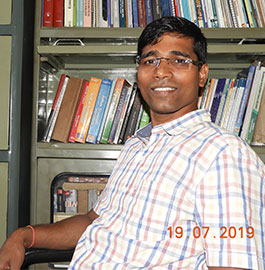
Dr. Pradeep Kumar Choudhury
Assistant Professor
Zakir Husain Centre for Educational
Studies,
School of Social Sciences
Jawaharlal Nehru University, India
Dr. Pradeep Kumar Choudhury is working as an Assistant Professor of Economics at Zakir Husain Centre for Educational Studies, School of Social Sciences, Jawaharlal Nehru University, New Delhi, India. He has done his MA in Economics from University of Hyderabad and PhD in Economics of Education from National University of Educational Planning and Administration (NUEPA), New Delhi. His research has dealt with various aspects of applied development economics, especially issues related to education, health and labour. Specific research interests include: education privatization and market policies, inequality in educational opportunity, family investment in education, dynamics of school choice. He has worked on some of these issues using large scale household data sets of National Sample Survey Organization (NSSO), National Family Health Survey (NFHS), India Human Development Survey (IHDS) and also from his own field studies. Currently he is engaged in an international collaborative study (in an experimental set-up) with the Freeman Spogli Institute for International Studies, Stanford University, USA that aims to assess and improve student learning in engineering and higher education in an international comparative perspective. Also, he has completed two other studies (sponsored by ICSSR and UPE-UGC) that examined the issue of inequality in educational opportunities among marginalized youths in India and the importance of financial incentives to bridge this, with special reference to rural Odisha. Some of his research works have appeared in the journals like Proceedings of the National Academy of Sciences, Asia and the Pacific Policy Studies, Economic and Political Weekly, Quality Assurance in Education, Higher Education for the Future and also as chapters in edited books/reports published by Oxford University Press, Routledge, and Springer.
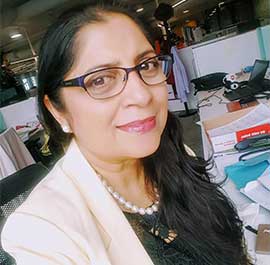
Dr. Mamta B Chowdhury
Senior Lecturer
School of Business Western Sydney University, Australia
Dr. Mamta B Chowdhury was born in Bangladesh and completed her undergraduate and post graduate studies in Canada and Australia. She has worked with several universities in Australia, Canada and Bangladesh before joining the Western Sydney University in 1999. She obtained a PhD and MEcDev degrees from the Australian National University and a Masters in Economics from the University of Manitoba, Canada. Dr. Mamta has published a number of significant economics and finance referred journal articles, book and book Chapters. She has acted as the chief editor and joint editor in the editorial board of a number of journals and proceedings. She has authored some significant publications in the area of economic sustainability and development, worker’s remittances and its effects on economic and financial growth and development of Bangladesh, internationalisation of education, stock markets of developing countries and institutional determinants of foreign direct investment. Currently, she has been supervising 6 PhD students and acting as one of the international academic leads of the School of Business of Western Sydney University.
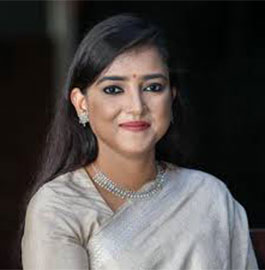
Nobonita Chowdhury
Director
Preventing Violence against Women Initiative (BRAC)
Nobonita Chowdhury is the Director of Preventing Violence Against Women Initiative at BRAC. Ms Chowdhury holds over two decades of outstanding experience in journalism,media and communications. Prior to joining BRAC, she was the Editor of DBC News. As a journalist, she has worked for leading electronic and print media organisations at home and abroad, including the BBC in the UK and Ekattor Television in Bangladesh. She became a household name as a presenter of radio and television talk shows and rose to nationwide prominence hosting her own primetime talk show “Rajkahon- Nobonita Chowdhuryr Shathe”. These experiences have helped her master a strong ability to identify, absorb and prioritise complex information and present it to the target audience in the most effective manner to achieve the highest possible impact. As a member of the communications team at mobile operator Robi, she had the rare opportunity to strategize and execute the external communications for the first and biggest ever merger in Bangladesh’s telecom sector between Robi and Airtel in 2016. She had played a pivotal role in developing the messages and communication materials for UNICEF’s nationwide ‘Quality Education for All’ campaign in her early twenties as a social communication executive of Bitopi Advertising agency. Ms Chowdhury started her career as a Sub Editor in the Daily Bhorer Kagoj, when she was only 18 after being a regular writer/contributor for few years already. After joining Ekushey Television as a researcher during her university days, she had travelled all over Bangladesh to find out real life stories from the grassroots- from Teknaf to Tetulia, Sundarbans to Chittagong Hill Tracts, including the Chars and Haors. Her travel exposure to rural Bangladesh and the world has given her an unparalleled ability to analyse and understand the obstacles and progression of various societies. Ms Chowdhury has received the prestigious ‘Anannya Top Ten Award’ in 2017 as a leading woman of her time. She had the honour to seat as a member of the Jury Board for the ‘Nasreen Smrity Padak’ given annually by Action Aid- Bangladesh. Ms Chowdhury has been invited to speak at the Plenary Session of the World Press Freedom Day Global Conference in Addis Ababa, organised by the UNESCO in 2019. Ms Chowdhury holds an MA in Human Rights Law from School of Oriental and African Studies (SOAS), University of London, and an LLB (Hons) from University of Dhaka.
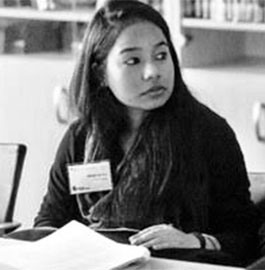
Minakshee Das
Consultant
Ministry of Steel
Government of India, India
Minakshee Das is a Consultant at the Ministry of Steel, Government of India and an Erasmus Doctoral candidate at the University of Ljubljana, Slovenia. She was previously Consultant at the Indian Council for Research on International Economic Relations (ICRIER), New Delhi, India. She is a FDI expert and has completed various projects related to capital flows and trade funded by DfID and Government of India. Presently, she is handling the Steel Import Monitoring System (SIMS) of Ministry of Steel, Government of India. She has also served at the National Bank of Slovakia to complete a project entitled, "Trade and firm performance: evidence from Slovak Republic", as a Research Economist.Minakshee read for the Bachelors degree at Gargi College, University of Delhi and for the Masters degree at Indian Institute of Technology (IIT) Guwahati, India. And, went to University of Ljubljana, Slovenia to obtain PhD degree as an Erasmus Scholar. Her research interests include empirical macroeconomics, international trade & business and economic development.
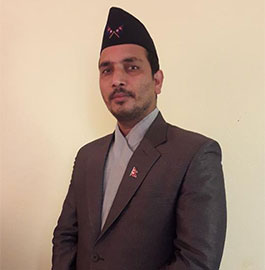
Dr. Niranjan Devkota
Coordinator
Quest Research Management Cell
Quest International College, Nepal
Dr. Niranjan Devkota is an economist with special focus on agriculture, climate change and contemporary issues over a decade. He has received his PhD degree from Tribhuvan University, Nepal in August, 2018. He is now working as coordinator of Research Management Cell at Quest International College affiliated to Pokhara Univeristy, Nepal. Dr. Devkota has attended trainings and workshops organized by UNESCAP, NDRC (China), SANDEE (ICIMOD), Hi-Aware (ICIMOD), SANEM (Bangladesh) and many other high level training and capacity building workshops on international co-operation, natural resource management and trade related activities in home and abroad. Dr. Devkota has been teaching economics, econometrics and research methodology in MBA and BBA since 2012. He also has worked in preparing strategic and implementation plans of several economic issues of Government of Nepal as an economist. He has command over SPSS, E-Views, STATA, GIS and R programming.
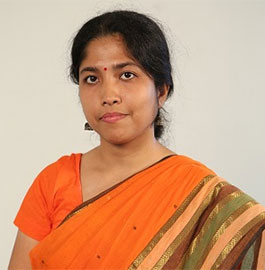
Dr. Swati Dutta
Associate Fellow
Institute for Human Development (IHD), India
Dr. Swati Dutta is presently working as an Associate Fellow at Institute for Human Development (IHD). She received her PhD from University of Madras, through Institute for Financial Management and Research (IFMR). Her main area of research is Development Finance, Growth and Human Development, Poverty and Livelihood, and Women’s Empowerment. She is also an expert in developing inequality adjusted human development index, concentration index and other related issues. Last four years she is engaged in various socio economic projects related to education, food security, social development, agriculture and agrarian change in the context of rural Bihar. She has good experience in handling large data set as well as strong econometrics and statistical background.
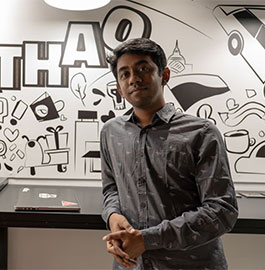
Hussain M Elius
CEO and Co-Founder
Pathao
Hussain M Elius is the CEO and Co-Founder of Pathao. Pathao is a platform for entrepreneurs, based out of Dhaka, with a vision of Moving Bangladesh forward. Where Pathao started as an ecommerce logistics company, within 24 months it ventured and became the market leader in e-commerce delivery, 2-wheeler and 4-wheeler ride-sharing and food delivery. With a team of over 600 people, Pathao is the largest tech company in Bangladesh, serving millions of transactions every month. Hussain was born and raised in Dhaka, and completed his postgraduate degree from North South University, Bangladesh. He also serves in the Industry Advisory board of his alma mater.
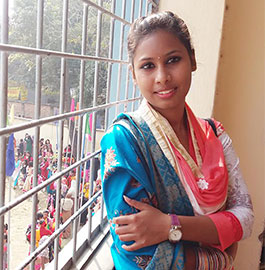
Farjana Eyasmin
Lecturer
Department of Economics
Pabna University of Science and Technology, Bangladesh
Farjana Eyasmin is currently working as a Lecturer, Department of Economics at Pabna University of Science & Technology, Pabna, Bangladesh. Her area of interest includes Microeconomics, Development Economics, Econometrics & Environment Economics. Her research works have been published on different journals titled with “Perception of and Adaptive Capacities to Climate Change Adaptation Strategies and Their Impact on Rice Production: A Case of Pabna District” and “Factors Motivating Rural Household to Climate Change Adaptation in Bangladesh: The MPPACC Approach”. She Completed her BSS and MSS in Economics from Pabna University of Science and Technology, Pabna, Bangladesh.

Adnan M. S. Fakir
PhD Scholar
Department of Economics
University of Western Australia, Australia
Adnan M. S. Fakir is a second year PhD Candidate at the University of Western Australia (UWA) and is a recipient of the Research Training Program Scholarship from the Australian Government. Adnan obtained his MSc from the University of Sussex and BSc from BRAC University.His interests lie in political economy, health, migration, conflict and female empowerment, and has publications in reputed journals, such as Economic Analysis and Policy, Health Economics, and World Development Perspectives, amongst others. Alongside his doctoral studies, Adnan is currently the principal investigator of an RCT, funded jointly by Johns Hopkins Institute for Global Tobacco Control and BRAC University, testing nudge-based interventions for tobacco intake reduction in the riverine islands of Gaibandha. He is also a co-investigator for a research project studying the impacts of forced sterilization and the use of health care in India, jointly undertaken by UWA and Saint Mary’s University. Adnan is presently on study leave as a senior lecturer at BRAC University and has previously worked as a Research Assistant for the Mind, Behaviour and Development Unit at The World Bank.
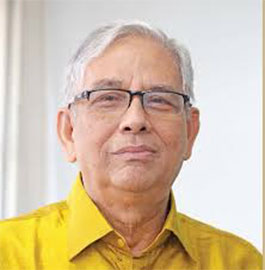
Dr. Mohammed Farashuddin
Former Governor
Bangladesh Bank &
Chairperson, Board of Trustees
East West University, Bangladesh
Dr. Mohammed Farashuddin is a president (Board of Trustees) and founder Vice Chancellor of East West University. Also Former Governor of Bangladesh Bank, the Central Bank of the country. An economist by training and socio-economist by conviction as well as practice Mohammed Farashuddin is currently the Chairperson of the Board of Trustees of East West University (EWU). The work entails significant responsibilities in management and compensation of 500 or so employees academic and non-teaching. He also was the Founder Vice Chancellor 1995-98, of EWU which is now a permanent sanad holder. In addition, he is a Senior Fellow and Member of the Board of Trustees of BIDS, Founder Member, Governing Council and Academic Council of the Bangladesh School of Economics, Senate Member, University of Dhaka, Syndicate Member, Jagannath University, Visiting Professor at the Institute of Business Administration (IBA), University of Dhaka and East West University.
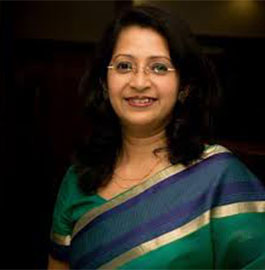
Dr. Farazi Binti Ferdous
National Consultant
Food and Agriculture Oragnization of the United Nations (FAO), Bangladesh
Dr. Farazi Binti Ferdous is a National Consultant at Food and Agriculture Organization of the United Nations (FAO), Bangladesh. Prior joining here she was a research fellow at the South Asian Network on Economic Modeling (SANEM). She worked as a trade consultant for the Asian Development Bank (ADB) and published the Bangladesh country paper for Indian Council for Research on International Economic Relations (ICRIER) and Swiss Programme for Research on Global Issues for Development. She has also worked for Asian Development Bank Institute (ADBI) and Waseda University Global Institute for Asian Regional Integration as research associate. Her research interests include international trade and development economics.
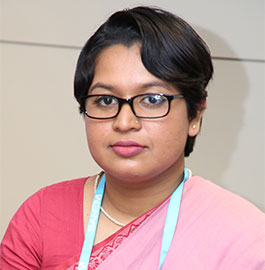
Rafiqua Ferdousi
Research Economist
SANEM, Bangladesh
Rafiqua Ferdousi is currently working as a Research Economist at SANEM. She joined SANEM as a Senior Research Associate on November, 2018. Prior to joining SANEM, she worked as a Research Associate at the BRAC Institute of Governance and Development (BIGD), BRAC University. She had also been a Visiting Researcher at the Institute of Employment Research (IAB) in Nuremberg, Germany. In addition, she had been a Lecturer at the Development Studies Discipline of Khulna University, Bangladesh. Ms. Ferdousi completed her Erasmus+ Joint European Master in Comparative Local Development Studies at the consortium of University of Regensburg (Germany), University of Trento (Italy), Corvinus University of Budapest (Hungary) and University of Ljubljana (Slovenia). She holds her Bachelor and Master of Social Sciences in Development Studies from University of Dhaka.
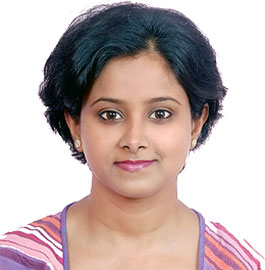
Dr. Sunetra Ghatak
Research Fellow
National Institute of Public Finance and Policy (NIPFP), India
Dr. Sunetra Ghatak is currently with the National Institute of Public Finance and Policy (NIPFP), New Delhi, India, as Research Fellow. She holds a Ph.D. in Economics from Jawaharlal Nehru University, New Delhi. She has ten years of experience in the field of socio-economic and development research. She has contributed in several research papers on development economics in various prominent national and international journals. Her specializations include labour, health, gender and trade related issues.
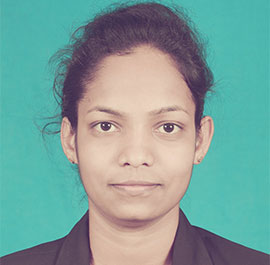
G.D.N.M Godagampala
Assistant Lecturer
Department of Economics and Statistics
University of Peradeniya, Sri Lanka
G.D.N.M Godagampala completed her graduation in 2017 with a BA degree in Economics from University of Peradeniya, Sri Lanka and completed her Masters in Economics in Postgraduate Institute of Humanities and Social Sciences, University of Peradeniya, Sri Lanka. She is currently working as an Assistant Lecturer at Department of Economics and Statistics since 2018. She provided contribution to the Department, being an editorial assistant, joint secretary and committee member of the organizing committee of the Peradeniya International Economics Research Symposium (PIERS) held in 2018 and 2019. She also engaged in doing researches under development Economics and Macroeconomics theory.
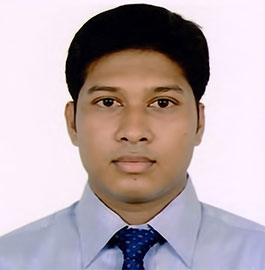
Emran Hasan
Assistant Professor
Department of Economics
Bangladesh University of Professionals (BUP), Bangladesh
Emran Hasan is currently working as an Assistant Professor of Economics at Bangladesh University of Professionals (BUP).
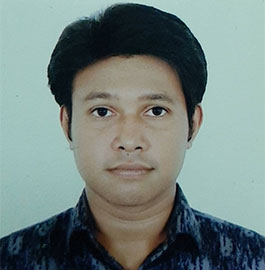
Abir Hassan
Department of Economics
Bangladesh University of Professionals (BUP), Bangladesh
Abir Hassan is currently in his fourth year of Bachelor of Social Sciences in Department of Economics, Bangladesh University of Professionals. He became the runner up in the quiz competition of EconMaster-1 in 2018 and the champion in inter house parliamentary debate in 2011. He has experiences in working with voluntary organizations and also has profound analytical and communication skills.
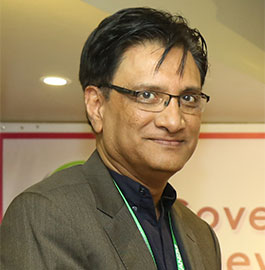
Dr. Mirza M Hassan
Senior Research Fellow & Head
Governance & Politics Cluster
BRAC Institute of Governance and Development (BIGD), BRAC University
Dr. Mirza M Hassan is a political economist and the Head of the Governance and Politics Cluster of BIGD, BRAC University. Dr. Hassan's research largely focuses on political development, state-business relations, urban governance and local governance, justice sector and human rights, and related issues in South Asia, Pacific region and North Africa. He has more than 20 years of consulting experience on these issues for DFID, The Asia Foundation, The World Bank, UNDP, CARE Bangladesh, and other development agencies. He is well versed in conducting political economy analysis, institutional and stakeholder analysis, and using mixed methods. He completed his PhD in Development Studies from the Institute of Commonwealth Studies (ICS), University of London, UK and his MA in Urban Studies and Planning from the Massachusetts Institute of Technology (MIT), Cambridge, USA. He is also an honorary Academic Fellow of the Institute of Development Policy Management (IDPM), University of Manchester, UK.
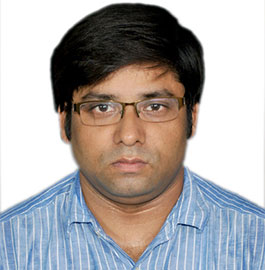
Dr. Somnath Hazra
Senior Fellow
School of Oceanographic Studies
Jadavpur University, India
Dr. Somnath Hazra is working as a senior fellow at School of Oceanographic Studies, Jadavpur University Kolkata, India and working on Climate Change Adaptation and doing Economic Modeling of the Impacts of Climate Change on Coastal Economy. Dr. Hazra had done his Ph.D in Ecological Economics from Rabindra Bharati University with more than 17 years of research experience in different Indian and international research centers, including University Grants Commission (UGC), India BC3 (Spain) and more than 10 years of teaching experience of M.Phil. (Environmental Economics), PG (Environmental Economics) and UG Courses (Environmental Economics) in Jadavpur University and Rabindra Bharati University and West Bengal State university,. He has experience in managing and executing Research projects and Development programmes in various capacities for Government, International Development organizations and Private Sector. He is working in the areas of climate change, forestry, biodiversity, agriculture and environment. His domain expertise is Economics of Climate Change, Forest Economics, Ecological Economics, Sustainable forest management, Economics of Biodiversity, Policy analysis, etc. He has presented more than 20 research papers in different countries like Turkey, Bangladesh, Sri Lanka, UAE, Nepal, Thailand, Belgium, Netherlands, UK, France, Kenya etc. and edited 5 volumes related to Environmental Economics and Development Economics. He has written more than 50 research papers on climate change, Ecological Economics, environmental and development economics. He has visited so far more than 15 countries for Ecological Economics and climate change related assignments and conferences. He was worked as a consultant economist for the Government of Kenya.
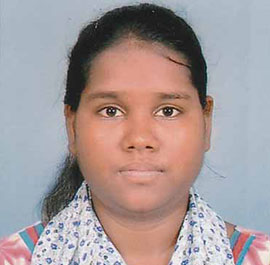
Sulekha Hembram
Assistant Professor
Department of Economics
Muralidhar Girl’s College, India
Sulekha Hembram has completed her M.A and MPhil Degree from Economics Department, Jadavpur University in 2016 and 2018 respectively and joined as Assistant Professor of Economics, Muralidhar Girls’ College, Kolkata on 3rd Sep, 2019. Her MPhil Dissertation was on Club Convergence among the states in India during 1980-2015 and currently she has been doing research on exploring multidimensional human deprivation trap at the disaggregate level in India. She has credited two published articles from reputed journals like Indian Economic Review (Springer Publication) and South Asia Economic Journal (Sage Publication). She has presented her research papers in various seminars and conferences organized by different academic institutions like ISI (IGC Conference-2017), CESP (JNU -2018), CU(Kolkata-2018), RBI(Kolkata-2018), DSE(New Delhi-2019), KU(Kalyani, WB-2019).
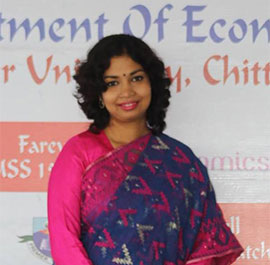
Faria Hossain
Lecturer
Premier University, Bangladesh
Faria Hossain has more than six years of teaching and research experience and is currently working as a faculty member in the Department of Economic at Premier University, Chittagong. She completed her BSS (2008) and MSS (2009) in Economics from the Chittagong University, and is at present pursuing her Ph.D. in Economics from the same university. Her research interests include development economics and underdevelopment, political economy and public policy, and women empowerment and her intended thesis topic is “Women Empowerment and Child Welfare in Developing Countries”. She has published four scholarly articles (including three journal articles) on issues such as, sustainability, socio-economic development, inequality, and feminist economics.
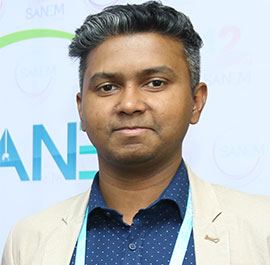
Zubayer Hossen
Research Economist
SANEM, Bangladesh
Zubayer Hossen is currently working as a Research Economist at South Asian Network on Economic Modeling (SANEM). He worked as a Senior Research Associate and Research Associate at the same organization. Prior to joining SANEM, he worked as an Executive at The Nielsen Company (Bangladesh) Ltd. He completed both of his Masters and Bachelors in Economics from University of Dhaka, Bangladesh. His research interest includes environment and climate change, inclusive development and labor market. So far, he has coordinated and supervised few big projects in collaboration with different local and international agencies and organizations such as UNDP, ILO, World Bank, BWB, GED, BUET, etc. Some of his research works include employment, productivity and sectoral investment in Bangladesh; regional investments and value chains in South Asia; Deltas, Vulnerability and Climate Change: Migration and Adaptation (DECCMA); improving the working condition in RMG sector of Bangladesh and SDGs need assessment and financing strategy.
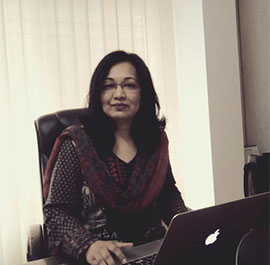
Dr. Rumana Huque
Professor
Department of Economics
University of Dhaka, Bangladesh
Dr. Rumana Huque currently employed as a Professor in Department of Economics, University of Dhaka. She specialises in health system and health economics with special focus on health care financing, resource allocation and budgeting, and economic evaluation. She is the Project Director of the Communicable Disease - Health Service Delivery (COMDIS-HSD) research programme consortium in Bangladesh. She got her PhD in Health Economics from University of Leeds, UK, in 2010. After completing BSS (Honours) and MSS in Economics from University of Dhaka, Bangladesh, she did MA in Health Economics from University of Leeds, UK in 2002. She has wide experience in working with the Ministry of Health and Family Welfare of Bangladesh, local NGOs and international donor agencies since 2002. She was the member in the Technical Working Group of the Ministry of Health and Family Welfare of Bangladesh on ‘Equity’ to develop a Health Care Financing strategy for Bangladesh. Dr. Huque has been involved in a number of studies in Bangladesh in the field of health system, health care financing and communicable diseases programs/ service delivery. A number of her papers/articles have been published in peer reviewed national and international journals. She has presented papers in national and international conferences including the Union, SRNT, Geneva Forum, AHES Conference, iHEA congress, Global Health System Research Symposium.
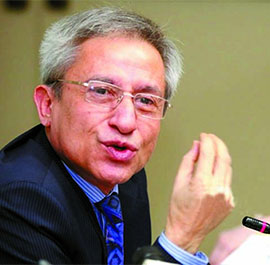
Dr. Zahid Hussain
Former Lead Economist
World Bank Bangladesh
Dr. Zahid Hussain was born in Dhaka on November 9, 1953. After completing his B. A. Honors in Economics from the Chittagong Government College in 1976, he did his Masters of Business Administration from the Institute of Business Administration, Dhaka University in 1979. Later, he completed his Master of Arts in Political Economy from Boston University, USA in 1987 and accomplished his PhD in Economics from Boston University in 1992. Dr. Hussain’s professional career started with journalism followed by 14 years of university teaching in Bangladesh, US and Poland. He joined the World Bank Dhaka office in May, 1995. He is a key member of the World Bank’s Macro Trade and Investment Global Practice team working on Bangladesh. He also leads the World Bank’s macroeconomic monitoring work and has been the lead author of the Bangladesh Development Updates published biannually from the World Bank’s Dhaka office every year. Furthermore, he was also the lead author of the Bank’s flagship report titled “Bangladesh:Towards Accelerated, Inclusive and Sustainable Growth—Opportunities and Challenges” published in November 2012. Dr. Hussain has been a key contributor to many other flagship products of the Bank such as the Development Policy Review, Public Expenditure Reviews, the South Asia Economic Focus and the Global Economic Prospects.
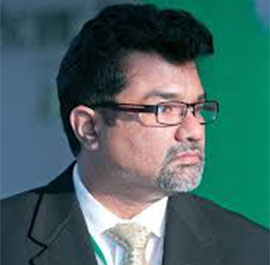
Asif Ibrahim
Vice Chairman
Newage Group
Asif Ibrahim received his formal education from the University of Delhi (India) and the University of North Texas (USA). Mr. Ibrahim is the Vice Chairman of Newage Group of Industries, a business house involved mainly in manufacturing and exporting ready-made garments, textiles and plastic products. The Ministry of Commerce of the Government of Bangladesh awarded him the Commercially Important Person (CIP) status in the year 2007 and 2012 for his contribution in national export. Mr. Ibrahim is the former President (2011-2012) of the Dhaka Chamber of Commerce and Industry (DCCI), the largest SME Trade Body of Bangladesh. He is the Advisor (Founder Chairman) of Business Initiative Leading Development (BUILD), a Public Private Dialogue platform to expedite the policy reforms to enable private sector led economic growth of Bangladesh. Mr. Ibrahim is a member of UNESCAP Business Advisory Council and is the Chairman of the UNESCAP Sustainable Business Network Taskforce on Disaster and Climate Risk Reduction. He was also a member of the Executive Committee of Bangladesh Employers’ Federation (2013-2016). He is the Director of Bangladesh Philippines Chamber of Commerce and Industry (BPCCI) and Bangladesh Thai Chamber of Commerce and Industry (BTCCI). Mr. Ibrahim served as a board member of Federation of Bangladesh Chamber of Commerce and Industry (2012-2015) and was the Chairman of the Privatization Standing Committee of FBCCI. He has previously been in the Board of France Bangladesh Chamber of Commerce and Industry (CCIFB) and is also the Former Chairman of the Research Cell of Bangladesh Garments Manufacturers and Exporters Association (BGMEA). Mr Ibrahim is a member of the Board of Advisers for BRAC Business School (BBS) under BRAC University. He is also a member of the Eminent Citizen’s platform to implement the Sustainable Development Goals (SDGs) in Bangladesh. He has recently been elected as the President of Bangladesh Professional Golfers’ Association (BPGA).
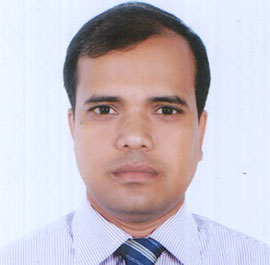
Md. Hafiz Iqbal
Assistant Professor
Department of Economics
Government Edward College, Bangladesh
Md. Hafiz Iqbal is an interdisciplinary researcher. He has conducted research activities in Bangladesh, Malaysia, Japan, and Norway. He has extensive analytical expertise in health hazards of population, poverty/environment nexus, setting priorities in pollution control, deforestation and ecosystem valuation, impacts of climate change on coastal zone, adaptation to climate change, and educational policy. He began his career in Banking and moved into Bangladesh Civil Service in 2005. He did his bachelor of social science (BSS) from Rajshahi University and master of social science (MSS) in Economics from the same. Later, he did his MS in development economics from Hiroshima University, Japan, MSc in climate change from IUB, Ph.D. in health economics from Bangladesh University of Professional (BUP). Currently, he is involved with MA in education at Nottingham University. He is working as an Assistant Professor (Economics) at Government Edward College, Pabna. He has written book chapters, journal papers and presented his work in several conferences worldwide.
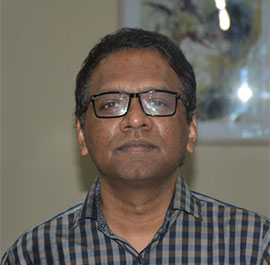
Dr. Kazi Iqbal
Senior Research Fellow
Bangladesh Institute of Development Studies (BIDS), Bangladesh
Dr. Kazi Iqbal is currently working as a senior research fellow at Bangladesh Institute of Development Studies. Dr. Iqbal received his Ph.D. in economics from University of Washington, Seattle, USA in 2006. After completion of his Ph.D. he worked for World Bank Institute in Washington DC for three years as a consultant in Poverty Reduction and Economic Management Division. He also taught at University of Washington and Macalester College, Minnesota. His research interest lies in macroeconomics, development economics and applied econometrics. He has publications in internationally reputed journal such as Journal of Public Economic Theory, Climate Change Economics, Developing Economies, Plos One, Demographic Research, BMC Public Health, etc. He is an associate editor of Journal of Bangladesh Studies and a member of the Editorial Advisory Board of Lahore Journal of Economics. Currently he is working as a Senior Research Fellow at BIDS.
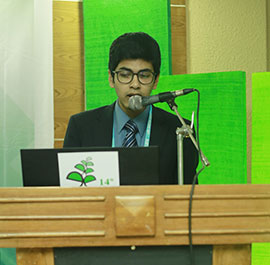
Tanjim-Ul-Islam
Department of Economics
University of Dhaka, Bangladesh
Tanjim-Ul-Islam is currently in his fourth year of Bachelor of Social Sciences in Department of Economics, University of Dhaka. He is currently the President of Economics Study Center, University of Dhaka. He became the runners up for his research paper in the 2nd Bangladesh Economics Summit, 2019. He also presented his research paper in the 14th South Asian Economics Students’ Meets, 2018 and the 2nd International Conference on Economics and Development 2018. He is an award winning essay author in United Nations (UN) World Interfaith Harmony Week 2017. His research papers were published 2nd volume of Bangladesh Students’ Digest on Economics and Development and BISC 2019 Online Proceedings.
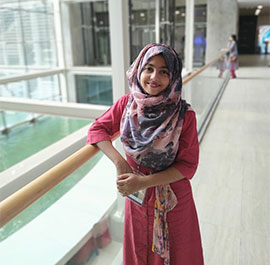
Farhin Islam
Department of Economics
University of Dhaka, Bangladesh
Farhin Islam is a student of Masters of Social Science at the Department of Economics, University of Dhaka, Bangladesh. The objective of her career is to join the development sector so that she can contribute to bring positive change in the lives of underprivileged. To work with the world’s renowned development organizations is her long-cherished dream. Till this period of life, she has some achievements. A paper lead-authored by her titled “Determinants of Methane Emission in Bangladesh using Environmental Kuznets Curve Analysis: ARDL Bounds Testing Approach” became champion of paper presentation competition on 2nd Bangladesh Economics Summit 2019 organized by Economics Study Center, University of Dhaka. Another research paper of her titled “A Cross Country Analysis to Determine the Causes of ‘Growth without Development’ Paradox” got published on the 2nd volume Bangladesh Students’ Digest on Economics and Development. She became champion at the national level data analysis competition “EconMaster 1.0” organized by BUP Economics Club. Above all, in 2019, she represent Bangladesh on an International platform. She presented her research paper on Children Food Security at the 15th South Asian Economics Students’ Meet (SAESM), Colombo, Sri Lanka. Though she is doing her major in Economics, Graphic Designing is another passion of her. She has worked as a Graphic Designer for more than two years at Alokito Shishu, a foundation that works for the education of the underprivileged children.
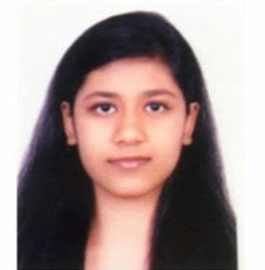
Samanta Islam
Department of Economics
University of Dhaka, Bangladesh
Samanta Islam is a Masters student of Bachelor of Social Sciences in Department of Economics, Bangladesh University of Professionals. She is a professional content writer. She has presented her research papers in the 1st Bangladesh Economics Summit, 2018 and Econ fest 4.0 hosted in North South University. She also has a publication of a co-authored research paper. She is also the Head of Documentation, BUP Global Affairs Council and Head of Operations, BUP Debate Club.
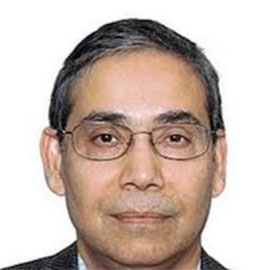
Dr. Iyanatul Islam
Adjunct Professor
Griffith Asia Institute
Griffith University, Australia
Dr. Iyanatul Islam held, until recently, a director-level appointment at the International Labour Organization (ILO), Geneva, Switzerland with supervisory responsibility as Chief, Employment and Labour Market Policies Branch, Employment Policy Department, ILO Geneva. He was responsible for leading, coordinating and managing the work of over 40 staff. He is now Adjunct Professor, Griffith Asia Institute, Griffith University, Brisbane, Australia. Yan held the position of Professor of International Business, School of International Business and Asian Studies, Griffith University, Nathan Campus, Brisbane, Australia from 2003 to 2010, having first joined Griffith in 1989. He is an international development economist educated at Manchester (Bachelor of Arts in Economics, First Class Honours and Richard Cobden Prize Winner), Western Ontario (Master of Arts in Economics), Cambridge (PhD, Economic Development). Since the mid-1980s, he has worked as an external expert for the ILO and, on some occasions, for the UNDP. He is the author and co-author of more than 100 publications consisting of refereed journal articles, books and edited volumes, book chapters, working papers, policy reports (principally for the ILO) and commentaries in leading on-line journals (voxeu.org and Social Europe Journal). He is one of the founding editors of the Journal of Asia-Pacific Economy (Routledge, London and New York).
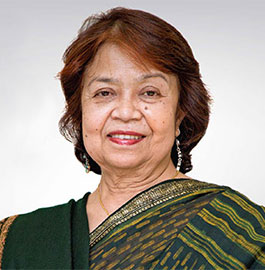
Professor Rounaq Jahan
Distinguished Fellow
Centre for Policy Dialogue (CPD), Bangladesh
Professor Rounaq Jahan was a Senior Research Scholar and Adjunct Professor of International Affairs at the School of International and Public Affairs at Columbia University, USA. She was a Professor of Political Science at Dhaka University and headed the women’s programme at the UN Asia-Pacific Development Center, Kuala Lumpur and the International Labour Office, Geneva. She was a Research Fellow at Harvard, Chicago and Boston universities in USA and Chr. Michelsen Institute in Norway. She was the Rajni Kothari Chair of Democracy at the Center for the Study of Developing Society (CSDS) Delhi, India. Professor Jahan received her PhD in Political Science from Harvard University. She is the author of several internationally acclaimed books and numerous articles. Most of her research is focused on issues of politics, governance, gender, development and health. Now Professor Jahan is served as a Distinguished Fellow at Centre for Policy Dialogue (CPD).
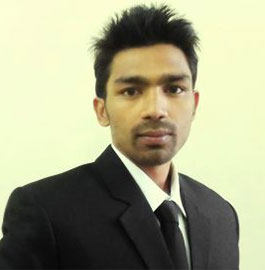
Md. Jahid Ebn Jalal
Senior Research Associate
SANEM, Bangladesh
Md. Jahid Ebn Jalal is a Senior Research Associate in the South Asian Network on Economic Modeling (SANEM). He did his Bachelor in Agricultural Economics from Bangladesh Agricultural University, Mymensingh and Masters of Science in Economics from Indira Gandhi Institute of Development Research (IGIDR) at Mumbai in India as well as Master of Science in Agricultural Economics from Bangladesh Agricultural University. He has a meaningful and eventful career in the research sector for last 4 years. He has great research practice in cooperation with apex donors such as UNDP, USAID, UNICEF, etc. His main responsibilities here include proposal writing, paper reviewing, data management & analysis, report writing, and coordinating with international and national community. In addition, Mr. Jalal has also worked closely with the Government of Bangladesh in preparing various policy documents and government flagship objects. In particular, he was actively engaged in drafting a number of chapters of the mid-term review of 7th Five Year Plan of Bangladesh (e.g. Progress with Water, Sanitation and Hygiene; Climate change and Environmental Stability). He also plays a crucial role in data collection, and preparation & conduct training for enumerators. Mr. Jalal has advanced computer skills and data analysis abilities through software such as Excel, STATA, SPSS, QGIS, ERDAS, etc. His research interest lies on poverty & inequality, social protection, agricultural economics and Environmental economics.
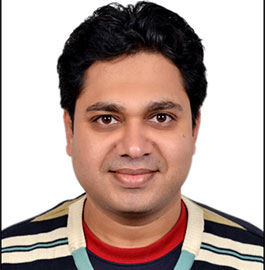
Dr. Debajit Jha
Assistant Professor
O P Jindal Global University, India
Dr. Debajit Jha is Assistant Professor of Economics at the Jindal School of Government and Public Policy at the O. P. Jindal Global University, Haryana, India. He has completed his Ph.D in economics from Jawaharlal Nehru University, Delhi. Before joining at the O. P. Jindal Global University, he taught at different government colleges in West Bengal for almost seven years and also worked as Assistant Director of Public Instruction to the Government of West Bengal for two years. His area of research is empirical macro and growth economics. He has publications in different national and international journals.
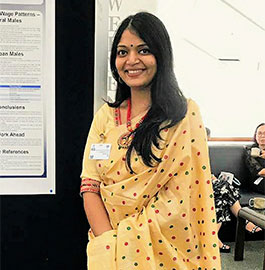
Mrinalini Jha
PhD Fellow
Department of Economics
Delhi School of Economics
University of Delhi, India
Mrinalini Jha is a PhD fellow at the Department of Economics in the Delhi School of Economics. Her research interest includes development economics, economics of discrimination, Indian economy and labour economics. Her doctoral work is in the broad field of inequality of opportunity. Beyond the economics of it, she is also interested in the related zones of sociology and politics of caste and gender. Post the completion of her PhD, she is keen on pursuing a career in academics and research.
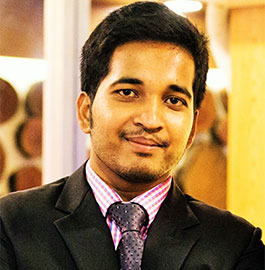
Jonaed
Research Associate
SANEM, Bangladesh
Jonaed is currently working as Research Associate at South Asian Network on Economic Modeling (SANEM). He completed his Bachelor’s and Master’s from the department of Economics, University of Dhaka, in 2017 and 2018 respectively. Throughout his student career, he was engaged with various voluntary and social organizations and depicted outstanding leadership skill. His research interest includes Macroeconomics, International Trade, Economic Modeling (CGE Analysis) and Political economy. Being a good academician is his dream
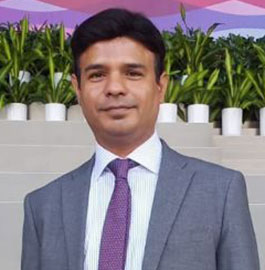
Mukesh Kumar Kella
PhD Scholar
Institute of Business Management, Pakistan
Mukesh Kumar Kella is currently doing his PhD at Institute of Business Management (IoBM) Karachi, Pakistan. He has 22 years of experience in Youth Enterprise Development, Strategy Design, Project Design & Management, Investment Promotion, Agripreneurship, Monitoring & Evaluation, Women Economic Empowerment, Entrepreneurship & SMEs Development, Capacity Building and Coordination with International Development Agencies. Mukesh has attended training programs in USA, UK, Switzerland, Singapore, Korea, India, Laos, Italy, Germany, China and Australia in the fields of Entrepreneurship & SMEs development, International Trade and cluster development. He was selected by USA State Department for International Visitor Leadership Program (IVLP). He has also conducted many training programs in the areas of Entrepreneurship, Cluster Development, Small Business Management and Export Market Analysis. He has also won Australian Endeavour Executive Award and Charles Wallace, UK Fellowship. He has keen interest in academic research and till now eight research publications and three conference papers are in his credit. He is currently working at a senior position, leading public sector SMEs Development organization in Pakistan.
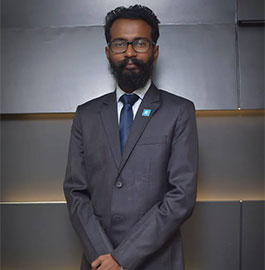
Ashraf S. Khan
Department of Economics and Social Sciences
BRAC University, Bangladesh
Ashraf S. Khan is currently pursuing his Bachelor of Social Science (BSS) degree with a major in Economics and a second major in Finance from BRAC University. Previously he has worked as a Research Assistant on the project entitled “Bangladesh Chars Tobacco Assessment Project (CTAP) 2018”. His areas of interest are Econometrics, Development Economics, and Behavioural Economics.
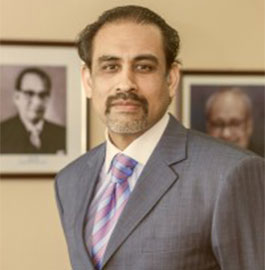
Abul Kasem Khan
Managing Director
A.K. Khan Telecom Limited
Abul Kasem Khan is a third generation entrepreneur and prides himself in being a Bangladeshi. He is the eldest grandson of late A K Khan, one of the founders of Bangladeshi gentry of entrepreneurs and former Central Industries Minister of Pakistan. Khan’s father late AM Zahiruddin Khan, a freedom fighter was the President of Chittagong Chamber of Commerce from 1974-76 and also President of the Federation of Bangladesh Chambers of Commerce & Industry (FBCCI) in 1977 and later Planning and Industry Minister. Khan is the Director, Corporate Investment of AK Khan & Company Limited. He was the president of Dhaka Chamber Commerce & Industries (DCCI) and envisioned the famous 2030 vision for Bangladesh. Having completed Bachelor of Science in Business Administration from Xavier University, Ohio, USA in 1992 he entered the family business in 1996. At present he is also the Managing Director, AK Khan Telecom Limited, Director, Akceycom Limited, Infocom Limited, A.K. Khan Penfabric Company Ltd, a joint venture with Penfabric Malaysia and subsidiary of Toray, Japan. In an exclusive interview with ICE Business Times, the visionary businessman shares his insights about the paradigm shift that Bangladesh’s economy can enjoy in coming years.
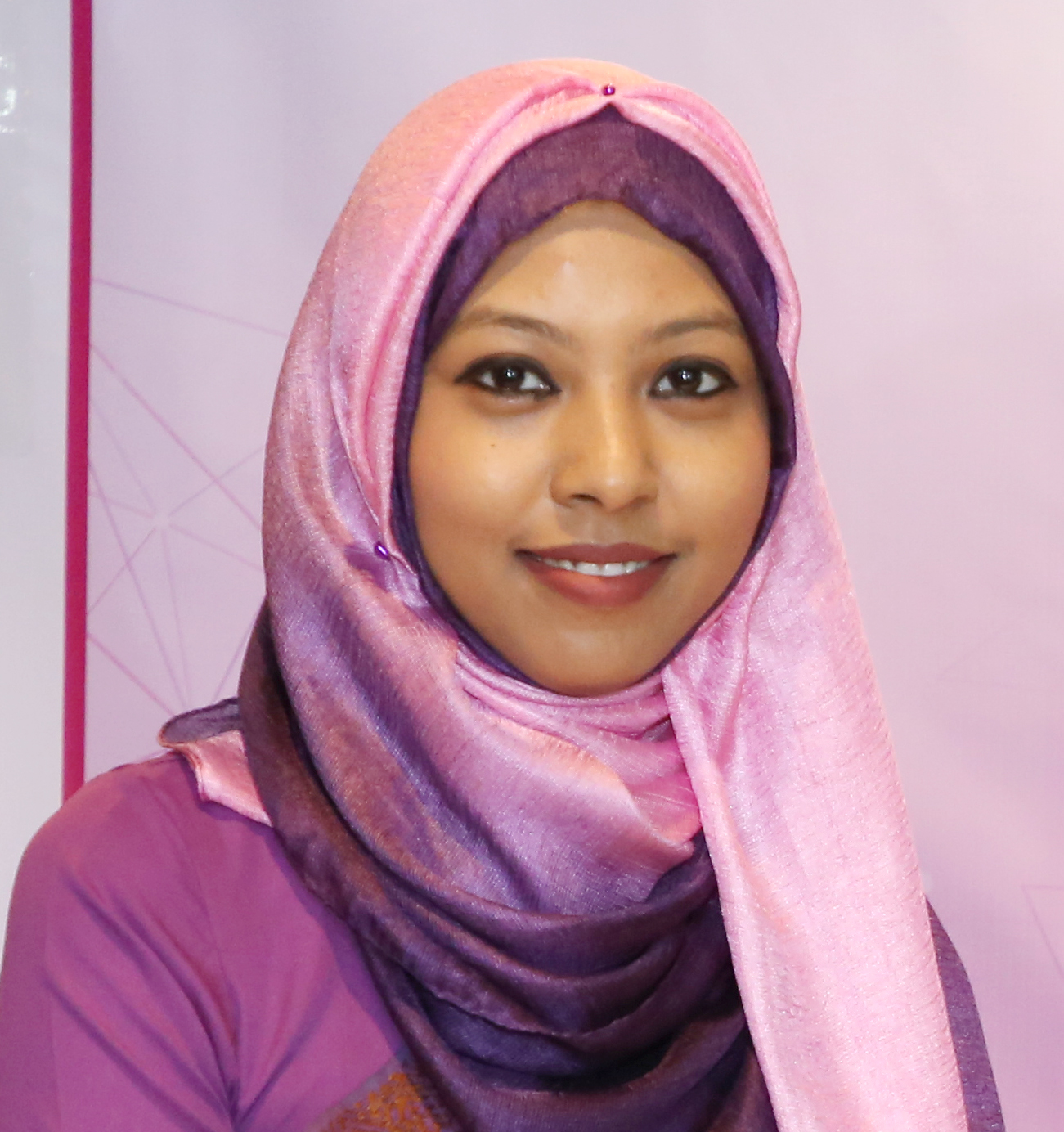
Sunera Saba Khan
Research Economist
SANEM, Bangladesh
Sunera Saba Khan is working as a Research Economist at South Asian Network on Economic Modeling (SANEM). She has also worked as a Senior Research Associate and Research Associate at SANEM. She completed her Masters in International Development: Public Policy and Management from the University of Manchester, United Kingdom and Bachelors in Economics from the University of Dhaka, Bangladesh. Her research interests include International Trade, Sustainable Development and Labor Economics. She is one of the editors of SANEM’s blog “SANEM CoRE” and one of the associate editors of “Thinking Aloud” - a monthly digest published by SANEM.
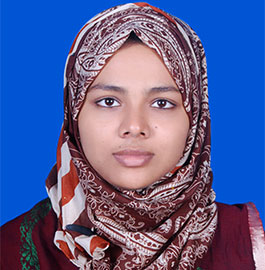
Amina Khatun
Economics Graduate
Khulna University, Bangladesh
Amina Khatun is an aspiring Economist. Her career objective is to teach in University. She has completed her Graduation and Post-graduation in Economics from Khulna University. Due to her interest in environmental economics, she conducted a research work on ‘Easy Bike Battery Recycling Channel and Influencing Factors: A Study in the South-west Region of Bangladesh’ during her Graduation period. Later, she accompanied another study on ‘Preferences for Improved Early Warning System among Coastal Households at Risk: A Study in the South-west Region of Bangladesh’ during Post-graduation period. An article based on the research findings is currently under review in journal of ‘Progress in Disaster Science’. Apart from these, she has co-authored a book titled ‘Economics- Second paper- class XI and XII’ for Bangladesh School Bahrain. She also assisted a project titled ‘What are Informal Smelters’ Recycling Preferences towards Spent Solar Home System Lead-acid Batteries in Bangladesh?’ as Research Assistant. Her professional career started with working as Research Associate at Centre for Policy Dialogue, one of the leading Think Tank in Bangladesh. There, she got opportunity to conduct intense study on Sustainable Development Goals and the position of South Asian countries towards achieving the goals. She has been college and university level Debate Champion and performed the responsibilities of Vice Chairperson of a career club Khulna University Economics Society (KUES). She wants to engage herself in more research work to contribute to the existing knowledge pool and benefit the society.
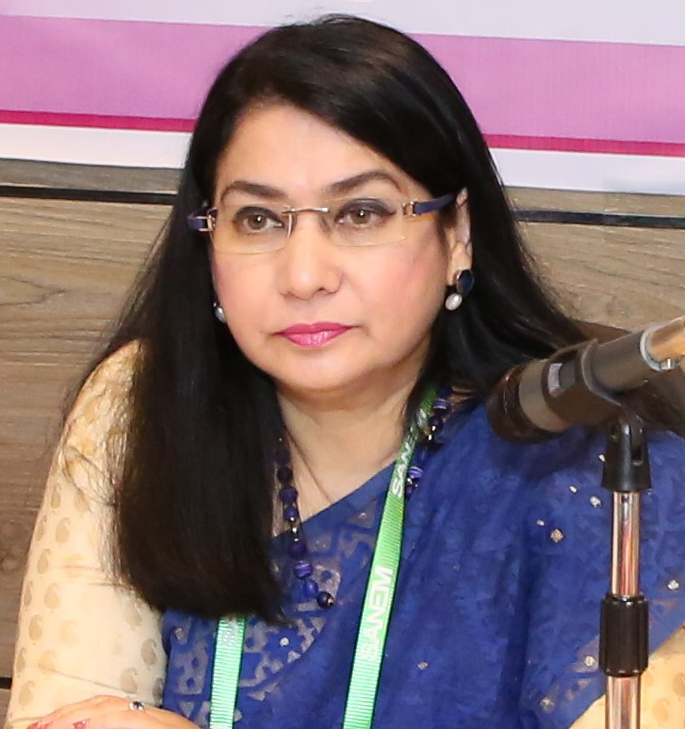
Dr. Fahmida Khatun
Executive Director
Centre for Policy Dialogue (CPD), Bangladesh
Dr. Fahmida Khatun is currently the Executive Director at the Centre for Policy Dialogue (CPD), Bangladesh. She did her Post-Doctoral research at the Earth Institute, Columbia University, USA. She has accomplished Masters and PhD in Economics from the University College London. Prior to joining CPD, she worked as a Research Fellow at the BIDS; as an Environment Specialist for the UNDP; as an Economist for the USAID Mission in Bangladesh. She taught economics at universities in Bangladesh and England. She was a Visiting Fellow at the Christian Michelsen Institute, Norway, at the Korea Institute for Industrial Economics and Trade, South Korea and Center for Study of Science, Technology and Policy, India. Dr. Khatun is a member of the Advisory Team of the Connect to Learn programme, a global education initiative run by the Earth Institute of Columbia University, New York. Dr. Khatun sits regularly in various policy-making bodies of the government. She was a Director of the SME Foundation of Bangladesh during 2011-2013. Dr. Khatun has undertaken research for several international organizations. Her areas of interest include macroeconomic issues, international development finance, SDGs, climate change, and gender economics.
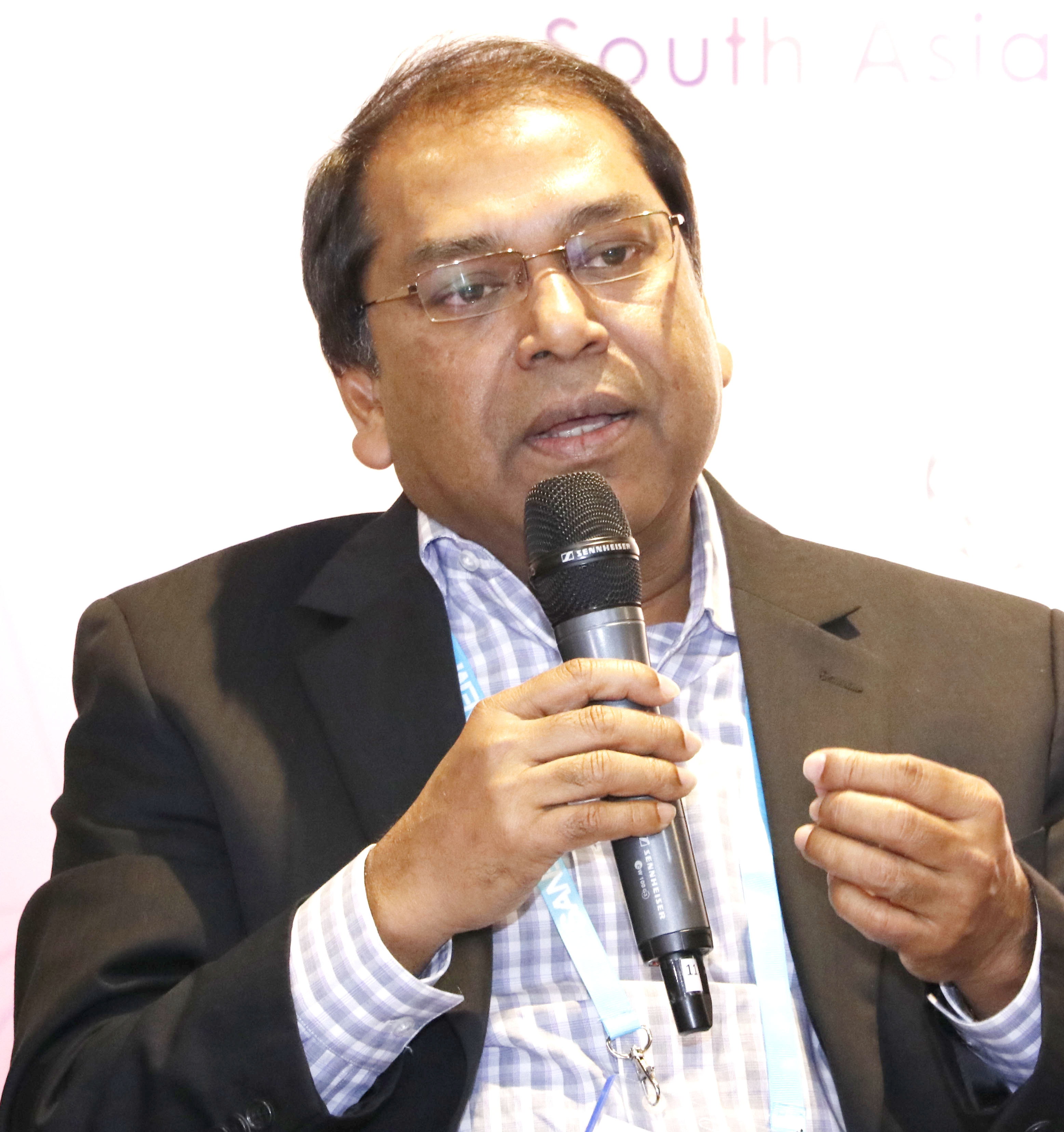
Dr. Bazlul Haque Khondker
Chairman, SANEM and
Professor, Department of Economics, University of Dhaka, Bangladesh
Dr. Bazlul Haque Khondker is a Professor at the Department of Economics, University of Dhaka and Chairman of the South Asian Network on Economic Modeling (SANEM). He holds a PhD degree in Economics and MSc degree in Quantitative Development Economics from the University of Warwick, England. He has more than 27 years of experience in the field of development economics and planning. His areas of expertise include analysis of poverty and social protection; micro, meso and macro data analyses for impact assessment and policy formulation; estimating economic cost of violence against women and girls; identification of regional disparities as well as promoting broad based inclusive growth; assessment of the distributional impacts of tax policy (including social protection) reforms using static as well as dynamic macro models as well as micro-simulation models; and assessing the trends in inter-generation equity using the National Transfer Account (NTA) methodology. He has also formulated the technical framework for the Five Year Plans for Bangladesh involving growth projection, macro consistent projection for sectoral growth, employment and poverty. He has constructed Social Accounting Matrices (SAM) and Computable General Equilibrium Models for several countries for analysis of poverty and income distribution impacts of trade and tax policy reforms. He has produced several reports and published articles, books on social issues including poverty and social protection, economic cost of violence against women and girls, regional disparity, economic and welfare impacts of public policy reforms. He has presented his analytical works in conferences held in Dhaka, The Hague, Quebec City, Kampala, Bangkok, Phnom Penh, Ulan Bator, Singapore, Kathmandu, Colombo, Nairobi, Abuja, Yaoundé, Maseru (Lesotho), Caracas, Mexico City, Hawaii and Boston organised by organisations such as UNDP countries offices, UNDP regional centres in Asian and Africa, the World Bank, the Asian Development Bank, the International Labour Office, East West Centre and the Central Bank of Venezuela. He has also worked in Mongolia (with UNDP/ADB); Indonesia (ILO); Sri-Lanka (UNRBAP); Bhutan (UNDESA); Morocco (the World Bank); Lesotho (UNICEF); Vietnam (UNDP); the Philippines (HelpAge International); Myanmar (HelpAge International); Hawaii (East West Centre); and Venezuela (the Central Bank of Venezuela).
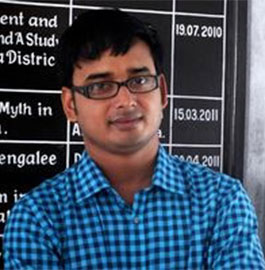
Dr. Arup Majumder
Research Associate
School of Languages and Linguistics
Jadavpur University, India
Dr. Arup Majumder has been trained in anthropology which was grounded in participatory fieldwork and application of anthropological knowledge for human welfare. The impact of land expropriation by the eminent domain of the state attracted his attention since student days during the turbulent years in West Bengal when acquisition of land and peasant protest in Singur and Nandigram became international events. What was badly missing in the debates and controversies around land acquisition was lack of empirical data at the micro-level. He decided to carry out empirical field investigations in Paschim Medinipur district in which acquisition of fertile agricultural land took place long before Singur and Nandigram in the wake of liberalisation in India. By using anthropological methods of fieldwork in the acquisition affected villages for his M.Sc. dissertation and doctoral work he could discover the micro-level ground realities on the socio-economic and cultural impacts of land expropriation (e.g. household level food insecurity and social disorganisation) which had macro-level policy implications. His research also revealed the absence of resettlement and rehabilitation arrangement beyond monetary compensation on the part of the government. On hindsight, this field based research on development caused forced displacement and resettlement (DFDR) can be viewed as a kind of post project socio-economic impact assessment (SIA) with special reference to sustainability in a village affected by land expropriation and therefore bear important contemporary applied and policy relevance. Currently he is writing a full-length monograph based on my doctoral work. His current engagement in a UGC project on Indigenous and Endangered Languages of India at Jadavpur University is also an engagement in teaching and research work in which he actively take part in training graduate students in culture and language documentation. Teaching and research is an integral part of his academic identity. Beside this he has also published a good number of research articles in peer-reviewed journals on DFDR and Endangered Languages and presented papers in a number of international and national level seminars and conferences in India and Bangladesh.
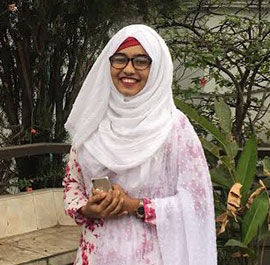
Fahmida Haq Majumder
Research Associate
SANEM, Bangladesh
Fahmida Haq Majumder is currently working as a Research Associate at South Asian Network on Economic Modeling (SANEM). She has obtained her M.S.S and B.S.S degree from Department of Economics, University of Dhaka. Her research interest includes Social protection, International trade, SDG, Environmental and climate change etc.
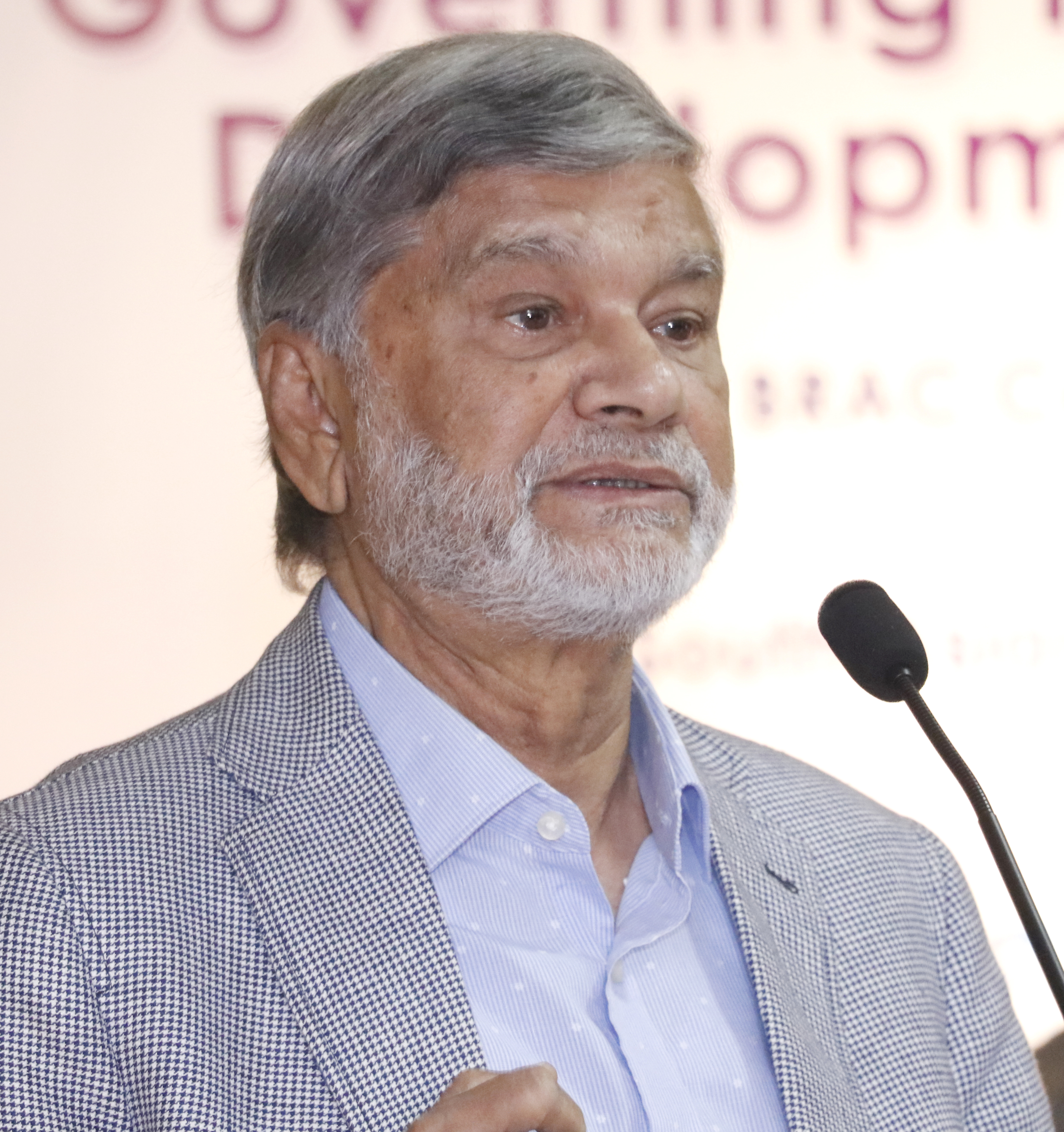
M. A. Mannan, MP
Honorable Minister
Ministry of Planning, Government of the People's Republic of Bangladesh (TBD)
M. A. Mannan, MP was born in the Dungria village of the Sunamganj district in 1946. He received his early education in his village school and completed his O-Level examinations from the Pakistan Air Force School in Sargodha. After graduating from Dhaka University he joined the Civil Service in 1974 and served in the government of Bangladesh in various positions, including deputy commissioner of Kishoreganj, Mymensingh and Chittagong. He worked as a Joint Secretary (political) in Ministry of Home Affairs, Director General in the Prime Minister's office and Director General of NGO Affairs Bureau. He also served in the Bangladesh Permanent Mission in Geneva as Economic Minister and retired from government service in 2003 as chairman of the Bangladesh Small and Cottage Industries Corporation (BSCIC). He joined the Bangladesh Awami League in 2005 and was elected Member of Parliament in 2008. During that period he served as Chairman of the Parliamentary Standing Committee on Public Accounts. He also served as a member in the Parliamentary Standing Committee of the Ministry of Public Administration, Ministry of Finance and Ministry of Defense, in which he represented the Prime Minister. Having returned second time as Member of Parliament he has been appointed in the new Cabinet of Prime Minister Sheikh Hasina as State Minister of Finance on 12 January 2014. After the Eleventh Parliament election, he was appointed a Minister of the Ministry of Planning on 7th January in 2019. He is interested in development literature and spends his time working for the welfare of the rural people of Bangladesh.
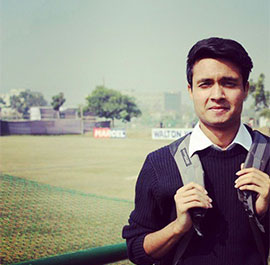
Abdullah Mahir Masud
Department of Economics
University of Dhaka, Bangladesh
Abdullah Mahir Masud is a 4th year student of Bachelor of Social Sciences in Department of Economics, University of Dhaka. He has won several awards in astronomy and environment Olympiads and debate competitions during his high school years. He has also worked as a community development officer for South Asian Youth Society in 2015-16. He has been awarded the Governor scholarship two times in a row in the sessions 2017-18 and 2018-19 for his excellent academic achievements in university.
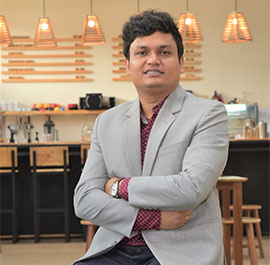
Dr. Md. Aslam Mia
Senior Lecturer
University of Sains Malaysia, Malaysia (USM)
Dr. Md. Aslam Mia holds a PhD in development economics from University of Malaya, Malaysia. He is currently a Senior Lecturer at the School of Management (SOM), University Sains Malaysia (USM). Dr. Mia has published around 25 articles related to productivity and efficiency of financial institutions, market structure, microfinance and, urban economics in internationally reputed peer-reviewed journals. All his publications are based on secondary sources of data (mostly panel data). Among some of the journals he has published are, The European Journal of Development Research, Business History, Journal of the Asia Pacific Economy, Sigapore Ecoomic Review, Journal of Cleaner Production, Social Indicators Research, International Journal of Social Economics, Cities, Economic Analysis and Policy, Strategic Change and others. He also presented his research findings over 15 national and international conference/seminar during the last five years. Due to his significant contribution in research and publication, Dr. Mia received the “Ph.D. Candidate with Highest Impact Publications" award by the University of Malaya in 2018.
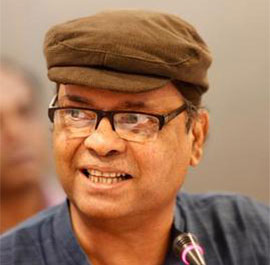
Dr. Mahbubul Mokaddem
Professor, Department of Economics
University of Dhaka, Bangladesh
Dr. Mahbubul Mokaddem is serving as a Professor of Department of Economics, University of Dhaka. He has been engaged as a research consultant by UNDP in 2002 to review all its developmental projects in Bangladesh in order to find out the MACRO-MICRO linkages. He has also been engaged by the UNDP, New York, in 1999 to write a background paper for the HDR: 2000. He has been engaged in two research projects on Privatization in Bangladesh and The Problems of Governance in Bangladesh in the Center of Policy Dialogue (CPD), Dhaka, under the direction of Professor Rehman Sobhan, from 1996 to 1998. He has carried out PhD research at the International Research Institute (IRRI), Social Science Division under the guidance of Dr. Mahabub Hossain, Head Social Science Division, IRRI for two years with a study leave from the University of Dhaka from 1994 to 1996. He has worked as a member of a core research team for one and a half year (1989 – 19900) at Bangladesh Institute of Development Studies in a cross-country international research project on Differential Impact Study of HYV Technology (DIS) sponsored by IRRI and guided by Professor Yujiro Hyami. He has served as a research consultant To the Agricultural Taxation Study Project, jointly sponsored by BIDS and Planning Commission of Bangladesh during 1984-85.
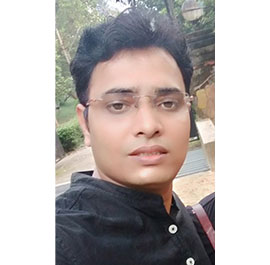
Snehasis Mondal
Research Scholar
Department of Economics
University of Calcutta, India
Snehasis Mondol is currently working as an Assistant Professor and Head in Department of Economics, Vidyasagar College, Kolkata, India. Now he is pursuing PhD in Economics at Department of Economics, University of Calcutta, Kolkata, India. He has received his M. Phil in Economics, Centre for Economic Studies and Planning, Jawaharlal Nehru University, New Delhi, India, 2011. He presented his papers in the Sam Moyo Memorial Conference, 21st – 23rd February, 2018, JNU, New Delhi titled with ‘Poverty, Agrarian Change and Form of Labour in Neoliberal India- a Comparative Analysis between Tribal and Upper Caste (Other)’ and in 5th International Conference on South Asian Economic Development, 21st – 22nd February, 2019, Faculty of Economics, South Asian University, New Delhi titled with ‘Decomposition of Poverty Disparity between Social Groups in Rural India: An Alternative Estimation’.
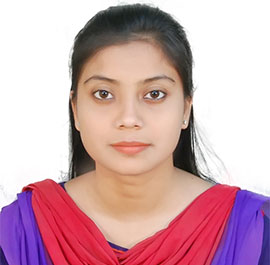
Kaniza Muhshina
Department of Economics
University of Dhaka, Bangladesh
Kaniza Muhsina is a student of Masters of Social Science at the Department of Economics, University of Dhaka, Bangladesh. She is currently the Joint Secretary of Dhaka University Judo and Karate Club and Editor of Publicity and Publications of Sufiya Kamal Hall Debating Club. She has been awarded the Governor Scholarship three times in a row for her excellent academic achievements.
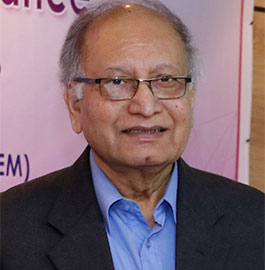
Dr. Mustafa K. Mujeri
Executive Director
Institute for Inclusive Finance and Development, Bangladesh
Dr. Mustafa K. Mujeri is the Executive Director of Institute for Inclusive Finance and Development (InM). Before joining InM he served as the Director General of BIDS since April 2009. He was the Chief Economist of the Bangladesh Bank (the country’s central bank). During his professional career, he also served as the Poverty Monitoring and Analysis Advisor of UNDP in Cambodia; Project Leader of the IDRC’s Programme of Micro Impact of Macroeconomic and Adjustment Policies (MIMAP) in Bangladesh; Director Research of the Centre on Integrated Rural Development for Asia and the Pacific (CIRDAP); Visiting Faculty at the Department of Economics, University of Queensland, Brisbane; National Expert in the Bangladesh Planning Commission; and Associate Professor of Economics, Rajshahi University. Dr. Mujeri obtained Ph.D. in Economics from McMaster University in Canada in 1978 after his graduation from Rajshahi University in 1970. He has wide ranging experience in consultancy and research on development issues in different UN and other international organisations and other multi-lateral, bilateral, and private sector organisations including NGOs. He has wide travel and work experience in many countries of the world and attended workshops, seminars, and meetings on a wide range of development issues. He has published extensively in national and international journals. He has also served in various policy making and other committees at both national and international levels. His current areas of research interest include poverty and MDGs monitoring and analysis; macro policy analysis and strategic development issues; application of modeling and quantitative techniques in development policy; public policy analysis; sustainable rural and participatory development; social development; poverty reduction strategy formulation and policy/programme development; monitoring and evaluation of programmes/projects, and monetary policy analysis.
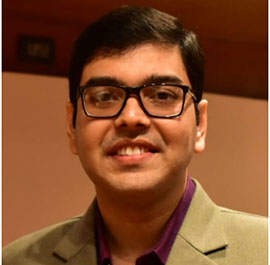
Sovik Mukherjee
Assistant Professor
Department of Economics
St. Xavier’s University, India
Sovik Mukherjee is an Assistant Professor in Economics and the Professor-In-Charge of M.Com, Faculty of Commerce and Management Studies, St. Xavier’s University, Kolkata. A Visiting Research Fellow (2019-2020) at NISPAcee, Bratislava, Slovak Republic for his work on “Economics of Multi-Sided Platforms”. He has been awarded with the International Collaboration Assistance Grant 2019 by the Indian Council of Social Science Research under the Ministry of Human Resource Development, Govt. of India for collaborative research work with NISPAcee. His research interests are in the areas of Application of Game Theory in IO Models, Public Economics, Applied Econometrics and Economics of Financial Crises. Besides, he is an Author-Affiliate at Information Resources Management Association (IRMA), USA and his membership in professional bodies includes Life Membership of the Indian Econometric Society (TIES), the Indian Economic Association (IEA), the Alumni Association of NCE Bengal Chapter & Jadavpur University and the Bengal Economic Association (BEA). He has contributed research papers in reputed journals at home and abroad, and also in edited books in different domains of economics published by Springer, Emerald Publishing, IGI Global, etc.
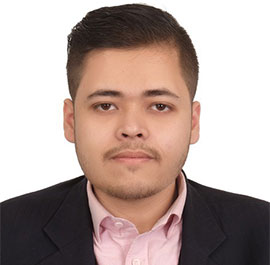
Muntasir Murshed
Research Officer
Bangladesh Institute of Development Studies (BIDS), Bangladesh
Muntasir Murshed is an aspiring economist who believes the sky is the limit when it comes to brainstorming in quest of generating research motivations. He completed both his Bachelor of Science in Economics and Master of Science in Economics degrees from North South University, Bangladesh. He is currently working as Research Officer at Bangladesh Institute of Development Studies (BIDS). Upon completion of his Bachelor’s degree, Muntasir worked as a Research Associate at NSU before joining the Centre for Policy Dialogue (CPD) as a Programme Associate (Research). His areas of research interest stem across Energy Economics, Sustainable Development Goals, Dutch Disease, International Trade and Tourism. Till date, Muntasir has published several of his research articles in reputed double peer-reviewed and scopus-indexed international journals. Muntasir, for his research endeavors, has received 9 ‘Best Paper Awards’ at several International Conferences as of now. He has represented Bangladesh at the 2nd Hallenic Association for Energy Economics (HAEE) conference in Athens, Greece and has presented a paper titled ‘How can Bangladesh prepare for the New Era of Renewable Energy Transition’ which was published as a working paper under the United States Agency for Energy Economics (USAEE).
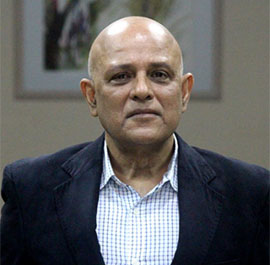
Dr. K.A.S. Murshid
Director General
Bangladesh Institute of Development Studies (BIDS), Bangladesh
Dr. K.A.S. Murshid is currently working as a Director General of Bangladesh Institute of Development Studies (BIDS). Dr. Murshid was awarded a PhD in 1985 by the Faculty of Politics and Economics, Cambridge University for his thesis on food policy. He has continued to work on food policy while at the same time branching out into a number of other research areas, including infrastructure and irrigation, informal and rural credit markets, agricultural markets and value chain finance, human resource development and policy research. He has published extensively in top development journals including the Bangladesh Development Studies, the European Journal of Human Development, World Development, Journal of Agrarian Change, Economic and Political Weekly and the Journal of Development Studies. He also has to his credit numerous other publications in the form of research reports, monographs and contributions to various edited volumes. Dr. Murshid combines extensive research experience with familiarity with a wide range of development settings in addition, including Bangladesh, sub-Saharan Africa, Sri Lanka, Indonesia, Pakistan, Myanmar, Thailand, Vietnam, Laos and Cambodia.
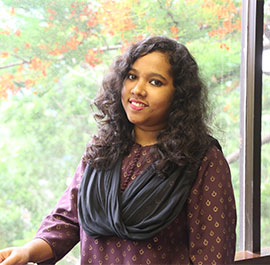
Mir Ashrafun Nahar
Research Associate
SANEM, Bangladesh
Mir Ashrafun Nahar joined South Asian Network on Economic Modeling (SANEM) on January, 2019 as Research Associate. She has obtained her BSS and MSS degrees from Department of Economics, University of Dhaka in 2017 and 2018 respectively. Prior to joining SANEM, she has worked on “Assessment of the Impact of the Rohingya Crisis in Cox’s Bazar (and Bandarban) Districts” conducted by Policy Research Institute (PRI), Bangladesh Antibiotics Behavior Survey (BABS) Conducted by Advancement through Research & knowledge Foundation (ARK) and Effect of Rohingya Influx on local people of Cox’s Bazar commissioned by UNDP. She has developed a strong knowledge of research and also depicted outstanding leadership skill throughout her student career. Her area of interests lies on the fields of Development Economics, Macroeconomics, Environmental Economics, Labour Economics and Economic Modeling. She is currently working on banking sector of Bangladesh, SDGs challenges for Bangladesh and Youth employment. Apart from research she likes to do paintings, reading books and travelling.
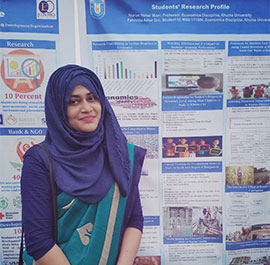
Fahmida Akter Oni
Department of Economics
Khulna University, Bangladesh
Fahmida Akter Oni received her M.S.S. degree and B.S.S. degree from Khulna University in Economics. Her research interests are primarily in the areas of poverty, migration and environmental economics. She has previously worked on poverty, vulnerability, inequality as well as health issues.
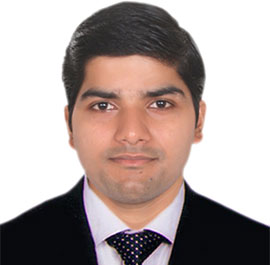
Balakrushna Padhi
Economist
Centre for Excellence in Fiscal Policy and Taxation (CEFT)
Xavier University, India
Balakrushna Padhi is working an Economist at Centre of Excellence in Fiscal Policy and Taxation (CEFT), XIMB Campus, Xavier University, Bhubaneswar, Odisha, India. His research interest includes issues in the areas of Development economics especially labour and welfare, poverty and inequality and the aspect of Gender and Child Budgeting. He has submitted his PhD from Centre for the Study of Regional Development (CSRD), Jawaharlal Nehru University, New Delhi. His Ph.D. topic is about, examining Income Mobility and Inequality Dynamics in the Indian Labour Market. Prior to this he has completed his MPhil. in Applied Economics at Centre for Development Studies (CDS), Trivandrum, Kerala. He has also published few research papers in some academic Journals and edited Volumes. Also, he has presented his papers in various national and international conferences and seminars. He has worked as a research assistant and consultant in many institutions such as, IIM Indore; CDS, Trivandrum; ISID New Delhi; CMDR, Dharward.
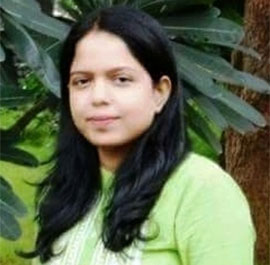
Hema Prakash
PhD Scholar
Centre for Studies in Economics and Planning
Central University of Gujarat, India
Hema Prakash is a PhD scholar at Centre for Studies in Economics and Planning, Central University of Gujarat, under the supervision of Dr. Jaya Prakash Pradhan. She holds MPhil in Economics with distinction from Central University of Gujarat. Her work is concentrated on labour and regional development. Her area of research interests is Labour Economics, Economics of Growth and Development, Regional Economics, Industries, Gender Issues in Economic Development. In the early of her academics, she has presented papers in national and international conferences –‘The Dynamics of Unpaid Care Work: Rediscovering the Hidden Faces of Economy’ in ISLE 57th Conference; a paper entitled ‘Thinking it Through: Inequality in Care Work and Challenges to Women’s Health’ under young scholar presented in 14th IASSH Conference -TISS and GIPE; ‘ Unfair Unpaid Care Work Obligation, Declining Capabilities and Women Poverty in India: Causes Consequences and Challenges’ in An International Conference by World Society Foundation, American Sociological Association and International Centre for Development and Decent Work- Development in the Faces Global Inequalities’; ‘Understanding Women’s Poverty Through Unpaid Care Work and Capability Approach’ in an international conference organized by The Commonwealth, ILO, UNICEF, IOM and UNESCO-MGIEP in collaboration with Ministry of Youth Affairs & Sports, GOI. ‘Estimating the Economic Contributions of Women through Unpaid Care Work’ at National Seminar on ‘Women in Household Economy: Issues and Challenges Towards Gender Equality’,ISl. She is author of the book ‘Disguised Labour Force under Unpaid Care Work’. She has published 3 research papers in national journals and a chapter ‘Estimating the Economic Contributions of Women through Unpaid Care Work’ in an edited book (to be released soon).She has also written a newspaper article ‘New Approaches to Employment and Unemployment Survey in India’. She has also participated in training program on ‘Labour Market and Employment Policies’ by Mahatma Gandhi Labour Institute and V VGiri, National Labour Institute and research workshop/training on research methods and big data (NSSO) handlingby Indian Council of Social Sciences and Research (ICSSR), The Indian Econometric Society (TIES) and Centre for Development Studies, Rajiv Gandhi Central University.
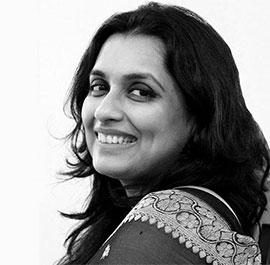
Maliha Quadir
Founder and Managing Director
Shohoz, Bangladesh
Maliha Quadir, a Bangladeshi -American, is a technology entrepreneur. Her start up Shohoz.com has done breakthrough work in digitizing the disorganized and male-dominated transportation industry in Bangladesh. Before Shohoz.com, she was based in Singapore as Director of Vistaprint’s digital business in global emerging markets. Prior to this, she worked for Nokia in strategy and business development for an emerging market focused digital content service called Nokia Life Tools, covering India, Indonesia, Bangladesh, China and Nigeria. Maliha also founded an online portal in Bangladesh while working for an ISP called bracNet. In the early part of her career, Maliha worked in Investment Banking, in Utilities Mergers and Acquisition department of Morgan Stanley in New York and San Fran and also in Debt Capital Markets of Standard Chartered Bank in Singapore. She holds an MBA from Harvard Business School and a BA in Computer Science and Economics from Smith College.
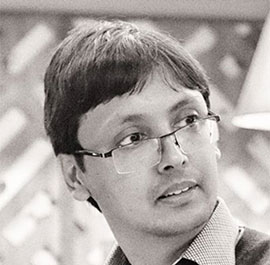
Dr. Atonu Rabbani
Associate Professor
Department of Economics
University of Dhaka, Bangladesh
Dr. Atonu Rabbani is an applied micro-economist with research interests in health, labor and organization economics. Currently, he is working in a number of research projects addressing intra-firm productivity and management issues in ready-made garment (RMG) sector in Bangladesh. He also works in public health field to understand how promotion using local women leaders and also monitoring and incentive can motivate better hand hygiene behaviors. Recently, he has also worked on evaluating an employer-based mandatory health security scheme to understand how incentives can alter households’ health seeking behavior. He has a number of papers published in international peer-reviewed journals like Journal of Regional Science, American Economic Review P&P, The Lancet, Annals of Internal Medicine, Journal of Biosocial Science, Health Services Research and Archives of Internal Medicine, among others. Atonu Rabbani is a Research Advisor at the BRAC Institute of Governance and Development (BIGD), BRAC University and also an Associate Professor in the Department of Economics at the University of Dhaka. He is also affiliated the James P. Grant School of Public Health at the BRAC University as an Associate Scientist. , Beside these he is an affiliate with the Urban Services Initiative of J-PAL and also a Research Affiliate with the International Growth Centre (IGC). Previously, he has worked as a full-time Research Fellow at the Institute of Microfinance (InM) and before that as a Post-Doctoral Fellow with the Department of Medicine and Center for Health and Social Science (CHeSS) at the University of Chicago. He earned his PhD in Economics from the Department of Economics at the University of Chicago in 2007 where he also got an MA in Economics in 2003. Before that he graduated from the Department of Economics at the University of Dhaka where he obtained MSS in 1998 and BSS (Honours) in 1997.
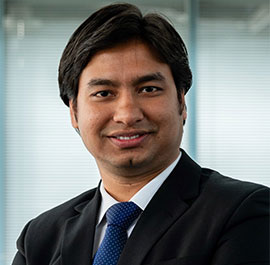
Ataur Rahaman
Deputy Director (Research)
Bangladesh Bank, Bangladesh
Ataur Rahaman is working as a Deputy Director (Research) at Bangladesh Bank, the central bank of Bangladesh. He received a Masters of Arts in Public Economics from National Graduate Institute for Policy Studies (GRIPS), Tokyo. He was awarded with a Dean’s Award for distinguished academic performance in Macroeconomic Policy Program from GRIPS. Previously, Mr. Rahaman graduated from University of Chittagong with both a Bachelor and a Master of Social Sciences in Economics. His research works have been published in Bangladesh Bank as working paper, special research work, and also in local and international journals.
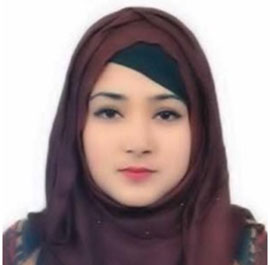
Rafiah Bintay Rahim
Department of Economics
Noakhali Science and Technology University, Bangladesh
Rafiah Bintay Rahim is a former student of Noakhali science and Technology University of the department of Economics. She has completed her BSS in Economics in the year 2016 and MSS in the year 2017 with thesis in Economics as well from Noakhali science and Technology University.She is interested in the vast and spreading research area of Economics especially in Labour Economics,Development Economics, Trade Economics, and Macroeconomics. Now a days she is working on the migration scenario of Bangladesh and looking forward to learn more about research works to develop her skills that would help and support her to learn and work more in this sector.
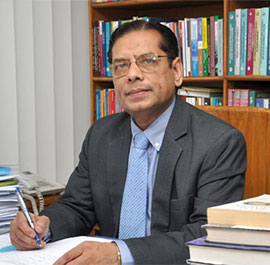
Professor Mustafizur Rahman
Distinguished Fellow
Centre for Policy Dialogue (CPD), Bangladesh
Professor Mustafizur Rahman is an Economist by training and is currently the Distinguished Fellow of the Centre for Policy Dialogue (CPD). Earlier, he taught at the University of Dhaka. Dr. Rahman was a visiting Post-Doctoral Fellow at Oxford University and Warwick University, UK and a Senior Fulbright Fellow at Yale University, USA. His recent research focus has been on Bangladesh’s macroeconomic performance, trade policy and external sector performance, WTO negotiations and interests of the LDCs, regional cooperation and economic integration in South Asia. Professor Rahman has published widely in Bangladesh and abroad. He was a member of Dhaka University Senate and served as a member of various national bodies set up by the Government of Bangladesh including Regulatory Reforms Commission, Core Committee on Connectivity and Panel of Economists for the Sixth and Seventh Five Year Plans of Bangladesh.
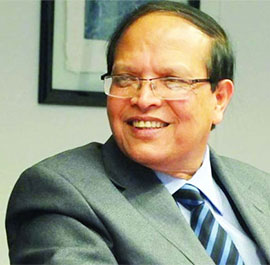
Dr. Atiur Rahman
Professor
Department of Development Studies
University of Dhaka and
Former Governor, Bangladesh Bank, Bangladesh
Dr. Atiur Rahman has been a renowned economist in his varied roles as a University Professor, researcher, banker and a leader in pro-poor, environment-friendly and gender-sensitive development paradigm. Prior to his assumption of the office of the Governor, he was a Professor of Economics in the Department of Development Studies (2006-2009), University of Dhaka, and Chairman of the Board of Trustees of Shamunnay, a centre for excellence in development research in Bangladesh. He also served as the Chairman of the Board of Directors of Unnayan Shamannay, a non-profit organization for research, development and cultural learning. His previous roles also include Director of Sonali Bank, the largest commercial bank in Bangladesh, Chairman of the Board of Directors of Janata Bank, the second largest commercial bank in the country and a long tenure as a Senior Research Fellow at the Bangladesh Institute of Development Studies (BIDS). He conducted various research works on economic development and published extensively on the micro-finance revolution in Bangladesh. For many years, Dr. Rahman also steered the Credit Development Forum (CDF) in Bangladesh as Chairman. He has been a known public face advocating for more humane development including pro-poor participatory budgeting.
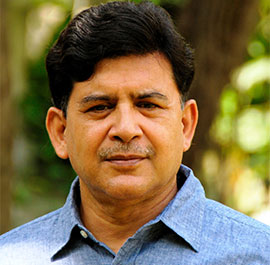
Dr. Hossain Zillur Rahman
Chairperson, BRAC and
Executive Chairman
Power and Participation Research Centre (PPRC), Bangladesh
Economist and social thinker Dr. Hossain Zillur Rahman is a leading policy voice of Bangladesh with over three decades of experience within and outside government. Holding a masters in economics from Dhaka University, and PhD in political sociology from the University of Manchester, UK, Dr Rahman was a leading researcher at the Bangladesh Institute of Development Studies between 1977 and 2000, and led the internationally renowned Analysis of Poverty Trends project (1989-98). In 1996, he founded the think tank Power and Participation Research Centre (PPRC) and has been its executive chairman since 2000. He was the lead consultant for the preparation of the first poverty reduction strategy paper, Unlocking the Potential, 2005, of the Government of Bangladesh and was a member of the SAARC Poverty Commission. Dr Rahman has also sat on the board of the central bank. He authored and edited many influential publications on poverty, social protection, governance, urbanisation, inclusive growth, social development and sustainable healthcare. Some of his noted works include Rethinking Rural Poverty (SAGE, 1995); Local Governance and Community Capacities (UPL, 2002); Unbundling Governance (PPRC, 2007); Researching Poverty from the Bottom up (PPRC/Grameen Trust, 2007); Bangladesh 2030: Strategy for Accelerating Inclusive Growth (DCCI/PPRC, 2010); Bangladesh Urban Dynamics (PPRC/World Bank, 2012); Bangladesh: Primary Education Stipends (PPRC/UNICEF, 2013); Social Protection in Bangladesh (UPL, 2014); Road Safety in Bangladesh (PPRC/BRAC, 2014); Realizing UHC Goals: Challenges & Opportunities for Bangladesh (PPRC, 2016); The Urban Spectrum: Metropolitan to Mofussil (PPRC/BBS, 2016); Exploring a more effective pro-poor targeting approach (PPRC/USAID, 2018). He has been a consultant to international organisations such as The World Bank, ADB, DFID, JICA, JBIC, UNDP, UNICEF, SIDA, SDC, WFP and UNFPA. As a regular resource person at the National Defense College, Dhaka, Dr Rahman lectures on nation-state system, world economic scene, national security and sustainable development. He is also the convener of civic platforms such as Health Bangladesh, and Safe Roads and Transport for All (SROTA). On 9 January 2008, Dr Rahman was appointed as an advisor to the former caretaker government of Bangladesh and put in charge of the ministries of commerce and education. He served till the end of the tenure of this government on 6 January 2009, and was credited with a lead role in the successful return of electoral democracy to Bangladesh. He was awarded Dr John Meyer Global Citizenship Award by the Institute for Global Leadership of Tufts University, USA, in November 2009. He became one of the three awardees of the Gold Medal Award 2013 of Rotary International Bangladesh for his services to humanity.
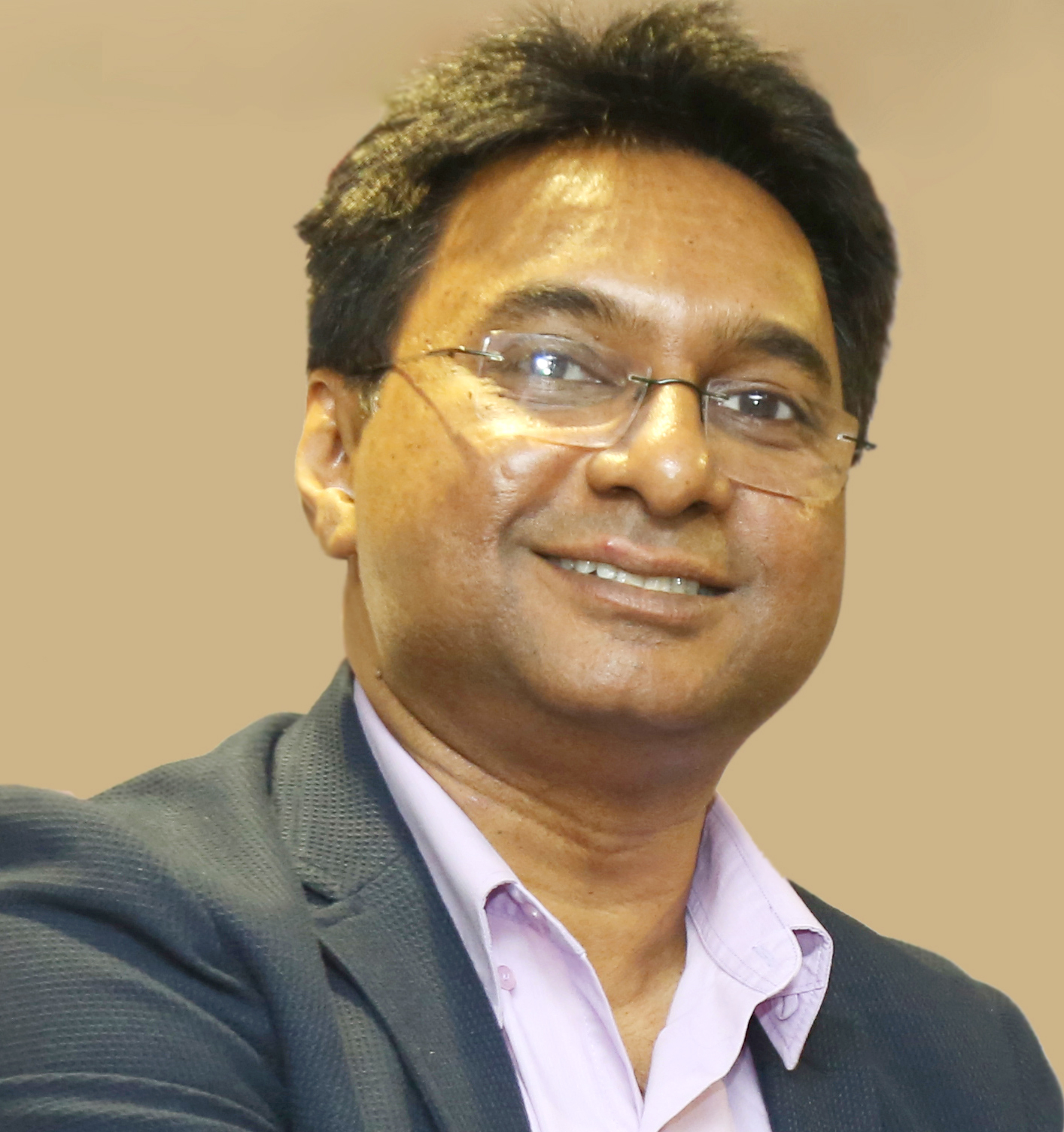
Dr. Selim Raihan
Professor
Department of Economics
University of Dhaka and
Executive Director, SANEM, Bangladesh
Dr. Selim Raihan is a Professor at the Department of Economics, University of Dhaka and the Executive Director of the South Asian Network on Economic Modeling (SANEM). He holds a PhD from the University of Manchester, UK. Dr. Raihan possesses vast expertise in research on international trade and trade policy issues related to the WTO, regional trading agreements and domestic trade policies. He has worked quite extensively on Applied Economics, especially assessing impacts of trade and economic policies, using country-specific Computable General Equilibrium (CGE) models, GTAP models, Social Accounting Matrix (SAM) techniques, WITS/SMART partial equilibrium models, and dynamic stochastic general equilibrium (DSGE) model. He has experience in research on poverty and labor market dynamics using household survey data and micro- and macro-econometric modeling and estimation techniques. His research interests also include the analysis of economic growth and political economy analysis of growth and development. He has a long experience in teaching international trade, economic modeling, quantitative economics, econometrics, development economics and poverty dynamics at University of Dhaka. Dr. Raihan has worked for several national and international organizations including the Asian Development Bank, the World Bank, UNDP, UNESCAP, UNCTAD, IFPRI, the Commonwealth Secretariat, FAO, European Commission, ILO, IDRC, DFID etc.
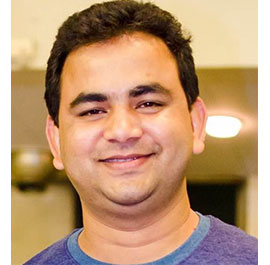
Dr. Nirmal Kumar Raut
Assistant Professor
Central Department of Economics Tribhuvan University, Nepal
Following his passion into academia, Dr. Nirmal Kumar Raut joined Tribhuvan University as an Assistant Professor and completed my MA and PhD in Development Economics from National Graduate Institute for Policy Studies in Tokyo. His area of specialty is Development and Behavioural Economics. His current research interest is in the socio-economic effects of Nepal's earthquake and their recovery in the post-earthquake Nepal. He is also researching on behavioural aspects affecting investment in clean energy vehicles. He is further interested in program evaluation using standard micro econometric techniques and cost benefit Analysis; and local financing issues including fiscal federalism.
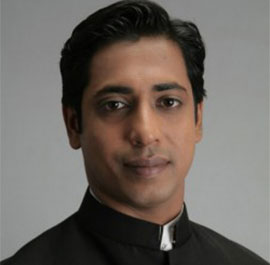
Nahim Razzaq, MP
Honourable Member of Parliament
People’s Republic of Bangladesh, Bangladesh
Nahim Razzaq is one of the youngest Member of Parliament in the Bangladesh National Parliament at present. He was elected by Sariatpur 3 constituency in 2013 in the by-election after the death of his father late Abdur Razzaq who is a national leader, one of the founding student activist pre-independence, a freedom fighter and organizer, 2 times elected general secretary of Bangladesh Awami League, 5 times member of parliament, former minister of Water Resources. Nahim Razzaq MP is one of the youngest lawmakers of Bangladesh with the experience of working in the field of Youth Development in different capacities. He is also the member of the Parliamentary Standing Committee on the Ministry of Youth and Sports, Convener of Young Bangla – National Youth Platform, member of the Parliamentary Causus for Children Rights Development and adviser of E-commerce Association of Bangladesh (e-cab). Nahim Razzaq completed B.A. Honours in Marketing and Business from Middlesex University, London, UK and then went on to finish his Post-Graduate Diploma on Marketing from Kingston University, Surrey, UK. Nahim Razzaq believes in engaging the youth population in the decision making process both in public and private sector. The Young Bangla Youth Platform hence does the facilitation in bridging the relationship between varies social initiatives. For his role in youth development, he received the Junior Chamber International- Top 10 Outstanding Young Person (TOYP) award in 2015 in Bangladesh.
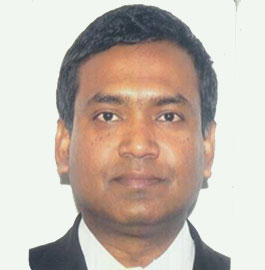
Dr. M.A. Razzaque
Research Director
Policy Research Institute (PRI), Bangladesh
Dr. Razzaque is a trained economist specializing in applied trade and development issues with extensive senior leadership and management experience at international level. During 2012-17, he was Head of International Trade Policy at Commonwealth Secretariat, London, directing its policy and global advocacy work related to emerging issues in world trade, trade negotiations, Aid for Trade, global value chains, trade between Commonwealth members, Brexit and its implications, etc. He was also the editor of Trade Hot Topics, one of the most widely read Commonwealth publication series. He has considerable experience in teaching international trade, development economics, and econometrics both at undergraduate and graduate levels as a faculty member of Economics Department at Dhaka University during 1998-2007. He has led and managed several multi-country (involving sub-Saharan African, South Asian, Caribbean and Pacific economies) and country-specific research projects on trade and development. Results of these projects have been documented in academic research articles, policy briefs, and as chapters in edited volumes. He possesses vast experience of organising international events, conferences, and workshops. He is regularly invited to speak as a panelist in international and regional events. He has presented papers in academic seminars; made presentations on conference/workshop themes; commented on technical and policy papers as a designated discussant; briefed senior government officials; and conducted training workshops on trade and development policy issues. He has also been called to provide evidence before House of Lords and House of Commons Committees (of the UK Parliament). Amongst others, his research was cited in The Economist, and, most recently, his analysis on implications of Brexit was published in many newspapers and online media outlets in several countries. He was the lead author of the first ever Commonwealth trade flagship report “The Commonwealth in the Unfolding Global Trade Landscape” the findings of which have been widely quoted, including in UK parliamentary debates.
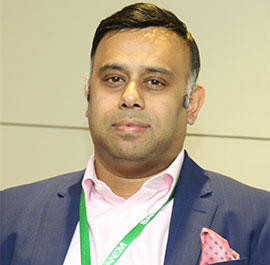
Dr. M. Masrur Reaz
Senior Economist & Program Manager
World Bank Group
Dr. M. Masrur Reaz is a Senior Economist in the Trade & Competitiveness Global Practice of the World Bank Group (WBG), and is currently the Country Coordinator for the same unit in Bangladesh. His unit supports global and country efforts to boost trade, enhance the investment climate, improve competitiveness in key economic sectors, and foster innovation and technology. Masrur, since 2012, heads WBG’s Investment Climate reform program in Bangladesh. He was the Task Team Leader for WBG’s Doing Business Reform Program in India which helped India to recently secure its largest ever improvement in the Doing Business ranking. He led the World Bank Group’s investment climate program in Nepal in 2013-2014, and led a strategy team in 2013 to develop Trade & Competitiveness strategy in Sri Lanka. He currently leads a WBG team that supports the Government of Thailand to improve its enabling environment for businesses. He also supported WBG investment climate work in Myanmar and Saudi Arabia. Some of the work of his team in Bangladesh includes: legal and institutional framework for Special Economic Zones, electronic tax registration at the NBR (E-TIN), automation of company registration, technical assistance to the Central Bank in drafting National Payment System Act and Electronic Payments Regulations, reform of several Board of Investment regulations, reforms in VAT and Customslegislations, introduction of Alternate Dispute Resolution (ADR) for tax and commercial disputes, setting up of Bangladesh International Arbitration Center, and public-private dialogue forum Business Initiative Leading Development (BUILD). Under his leadership, the Trade & Competitiveness unit is now currently working with Government of Bangladesh in strengthening Bangladesh’s export competitiveness, and to deepen Bangladesh’s integration with global and regional markets. The current work of the team also includes support to Government of Bangladesh on One Stop Shop for investors, improving Bangladesh’s Doing Business ranking, and introducing Good Regulatory Practice Principles. Dr. Masrur is a commonwealth scholar and he holds a Ph.D. in Development Economics from the University of Manchester, UK and an MBA from the University of New Orleans, USA. He has several publications in international journals.
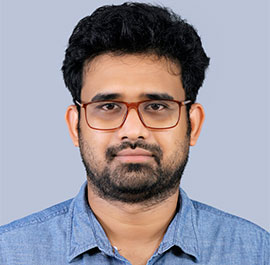
Smruti Ranjan Sahoo
PhD Scholar
Centre for Development Studies
Jawaharlal Nehru University, India
Smruti Ranjan Sahoo is currently perusing PhD at the Centre for Development Studies (JNU) Jawaharlal Nehru University, Thiruvananthapuram. He completed his M.A in Applied Economic form School of Economic, Hyderabad Central University, and M.Phil from Centre for Development Study, focusing on regional inequality. Presently, he is in the 4th year of his PhD, under the supervision of Dr M. Parameswaranand Dr. P.L Beena. The title of his PhD dissertation is “Industrial Agglomeration: A Study of Indian Manufacturing Sector”. He measured the nature and extent of industrial agglomeration, in the post liberalization period, in Indian manufacturing industries, and, now he is computing the productivity effects of agglomeration. He has been attaining various workshops and presenting research papers in different conferences. His broad research interests are in the field of Economic Geography, Economic Growth, Regional and Urban Economics.
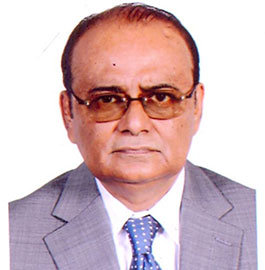
Dr. Zaidi Sattar
Chairman
Policy Research Institute (PRI), Bangladesh
Dr. Zaidi Sattar started his career as a Lecturer in Economics, Dhaka University in 1968; joined the Civil Service of Pakistan in 1969 and served in various positions in the districts and the Ministries of Bangladesh since 1971. In mid-career, he left for the USA for higher studies in Development Economics. In 1984, after completing his PhD in Economics from Boston University, he joined the faculty of Catholic University of America, Washington D.C., in the Department of Economics and Business, where he taught until 1992. Returning to Bangladesh in June 1992, he served as World Bank Advisor on tariffs and customs reform to the National Board of Revenue (1992-95) and later as UNDP consultant Macroeconomist at the Planning Commission (1995-96). He joined the World Bank, Dhaka Office, in 1996 where he served as Senior Economist, South Asia Region, Poverty Reduction and Economic Management until his retirement in September 2007. Between October 2007 and December 2008, he served as Vice-Chancellor, The Millennium University, Dhaka. Dr. Sattar is a founder Chairman of PRI which began its journey in December 2008. Dr. Sattar has some 40 publications in international and national journals and numerous papers presented on trade policy, private sector development and growth issues at national and international conferences. He is recognized as a leading expert on trade and tax policy issues in Bangladesh. He frequently offers policy advice to the Government of Bangladesh on trade, industry and macroeconomic policy issues. He also lectures on campuses, makes keynote presentations in seminars and workshops, and contributes op-ed pieces in local journals and newspapers. He is a life-time member of Bangladesh Economic Association, and Director of the following institutions: Southeast Bank Ltd., Industrial and Infrastructure Development Finance Company (IIDFC), and Venture Investment Partners Bangladesh Ltd. (VIPB).
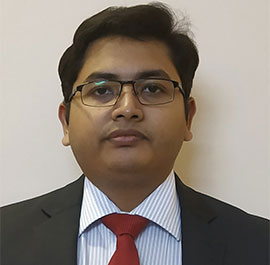
Darpajit Sengupta
PhD Scholar
Department of Economics
Jadavpur University, India
Darpajit Sengupta is currently pursuing his PhD in Department of Economics, Jadavpur University, Kolkata under the supervision of Professor Saikat Sinha Roy. He completed his master’s degree in Economics from Jadavpur University with specialization in International Trade and Econometrics. He graduated from Scottish Church College under University of Calcutta with 1st class First Position. His Research interest lies in Open Economy Macro Modelling, International Trade and Applied Econometrics. He is the recipient of prestigious University Grants Commission (NET) Junior Research Fellowship. He also received the Miller’s Prize and Sekhar Das Memorial Prize for his academic achievements from Scottish church College Kolkata. He has interned with Ministry of Statistics and Programme Implementation (MOSPI), Government of India and presented a paper titled “RURAL URBAN DISPARITY” and has acted as the Principal Guest Editor with The Times of India group. He is at present the visiting faculty at Department of Economics and Department of Business Administration, Scottish Church College Kolkata. He has published a paper titled ‘Impacts of Foreign Direct Investment and Remittances Inflows on Exchange Rate in South Asia’ with Research and Information System for Developing Countries (RIS), New Delhi. He has participated in various conferences at Presidency University, St. Xavier’s College, Jadavpur University, Exim Bank on various issues related to international Economics, Econometrics and Advanced Data Analytics Tools.
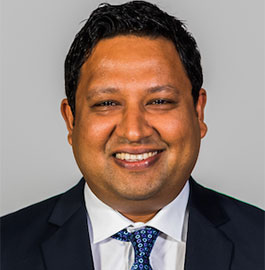
Kazi Faisal Bin Seraj
Country Representative (Bangladesh)
The Asia Foundation, Bangladesh
Kazi Faisal Bin Seraj is The Asia Foundation’s country representative in Bangladesh. Working in the international development field since 2006, Faisal has spent most of his career with BRAC International in Africa and Asia, including Bangladesh and Myanmar. His areas of expertise include women’s empowerment, economic development, microfinance, health and environment, research and evaluation, and technology for development. Prior to joining the Foundation, Faisal served as country representative for BRAC Myanmar, where he built a team of more than 300 staff providing financial and non-financial services to poor and marginalized clients through 42 branch offices. He also brings previous experience working in Bangladesh as a senior research associate for BRAC, where he managed the poverty and environmental research units, wrote numerous papers and articles, and designed and managed household surveys. From 2017-2018, Faisal was a Sloan Fellow and completed a full-time mid-career MBA program at the Massachusetts Institute of Technology. Following his time at MIT, Faisal designed a digital platform strategy for a financial diary project in Myanmar and advised Misfit Technologies, Ltd. in Bangladesh, a tech-start-up that supports farmers and livestock owners.
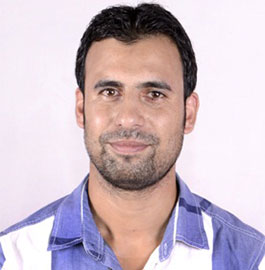
Irfan Ahmad Shah
PhD Scholar
Department of Economics
Centre for Development Studies Jawaharlal Nehru University, India
Irfan Ahmad Shah, is a PhD student at Centre for Development Studies (JNU) Jawaharlal Nehru University, Thiruvananthapuram, presently in the 4th year of his PhD, working on the topic “Monetary Policy in India: A study of its evolution, conduct and transmission under the supervision of Dr M. Parameswaran and Dr Srikanta Kundu. He completed his M Phil with the same institute on the topic “WELFARE COST OF INFLATION: Evidence from India” and the work has been published in Journal of Quantitative Economics. He has already completed two core chapters of his thesis dealing with the evolution and the conduct of monetary policy in India. The third chapter that deals with the transmission mechanism of Indian monetary policy is under progress.He started publishing his PhD work. A few of his papers got published as Discussion Papers at RIS New Delhi and my recent paper is undergoing review process with MIT Journal “Studies of Nonlinear Dynamics and Econometrics”. He has been presenting his research papers at various conferences and went to Belgium for a three month visiting PhD fellowship under Prof Gert Peersman (November 5th 2018 to January 31st 2019). His broad research interests are in the field of Macro, Monetary and Financial Econometrics.
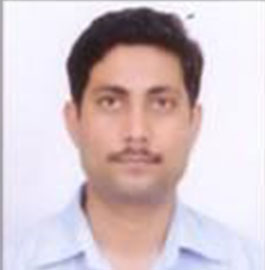
Dr. Akhilesh K. Sharma
Assistant Professor
Institute for Studies in Industrial Development, India
Dr. Akhilesh K. Sharma is a Development Economist. At present, he is Assistant Professor at Institute for Studies in Industrial Development, New Delhi, India. Previously, he has been affiliated with Institute for Human Development, New Delhi and Institute of Economic Growth, New Delhi. Dr. Sharma has obtained his doctoral degree in Economics from Banaras Hindu University. He has achieved international award in the category of young scholars from Alfred Nobel Charity Fund in 2011. He has achieved Jawaharlal Nehru Memorial Doctoral Fellowship during his Ph.D. His areas of research interests are MSMEs, start-ups, institutional economics, human development, social protection, inclusive growth, and macro-economic modelling.
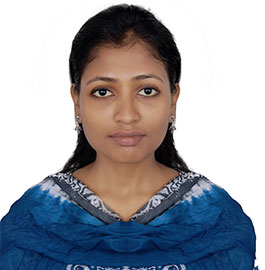
Eshrat Sharmin
Research Associate
SANEM, Bangladesh
Eshrat Sharmin is a research associate at South Asian Network on Economic Modeling (SANEM). She has completed Masters in Economics from Jahangirnagar University. Her research interests include inclusive development, labour market and health economics. She has been part of the research team conducting the “Study on Employment, Productivity and Sectoral Investment in Bangladesh”funded by General Economics Division (GED), Planning Commission, Ministry of Planning, Bangladesh
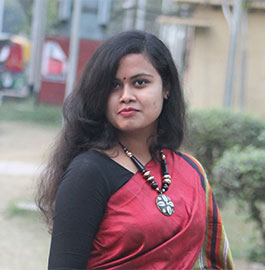
Fariha Nur Shoumee
Department of Economics
Rajshahi University, Bangladesh
Fariha Nur Shoumee is a research student at the Department of Economics, University of Rajshahi. She recently has completed her post-graduation from the same and has a graduation degree in this discipline as well. Fariha has actively worked in the Economics learning club of the department named Economics Study Circle and is the secretary of the club. Currently, she is learning the applied side of Economics.
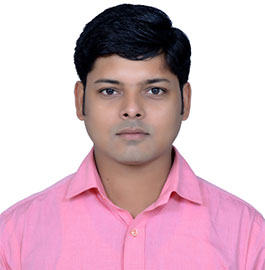
Dr. Puneet Kumar Shrivastav
State Coordinator
Micro Finance For the State of Uttar Pradesh, India
Dr. Puneet Kumar Shrivastav is currently working as State Coordinator, Micro Finance, for the State of Uttar Pradesh in the State Association. He has also worked as Cooperative Development Officer (CDO) at Banker’s Institute of Rural Development (BIRD), NABARD and conducted two Research Studies for NABARD. He was also associated with Institute of Economic Growth, New Delhi & Ministry of Panchayati Raj Institutions, New Delhi for conducting a research project on evaluation of Grants of 14th Finance Commission. Dr. Shrivastav was an Indian Council of Social Science Research (ICSSR) Doctoral Fellow in Economics at Giri Institute of Development Studies (GIDS) Lucknow, Uttar Pradesh, India and completed his PhD on “Skill Mismatch in the Labour Market: A Case study of Uttar Pradesh” from Department of Economics, Faculty of Social Science Banaras Hindu University (BHU) Varanasi, Uttar Pradesh, India. Earlier he has completed his Master of Philosophy (M.Phil.) in Economics from Central University of Gujarat (Gandhi Nagar) Gujarat, India. He is a Master in Business Economics and Finance and his research interest includes labour economics, banking and finance. He has published a paper in Scopus Indexed Journal International Journal of Social Economics (IJSE) of Emerald Groups (UK). Apart from this he has published 6 papers in reputed national level Journals & also 2 book chapters with national level publishers. He has also presented his research work in 05 International Seminars and in 08 National seminars/ conferences held in different parts of India.
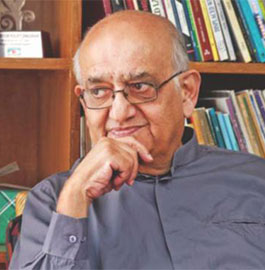
Professor Rehman Sobhan
Chairman
Centre for Policy Dialogue (CPD), Bangladesh
Professor Rehman Sobhan began his working career as the faculty of Economics, Dhaka University in 1957. Throughout his long and distinguished career as an economist, researcher, political scientist and public intellectual, Professor Sobhan has worked to uphold the welfare and interests of the average Bangladeshi, especially the poor. He has played an active advocacy role and made many contributions outside the world of academia, including serving as Envoy Extraordinary with special responsibility for Economic Affairs (1971), Member of Bangladesh Planning Commission (1972-74), Member of the Advisory Council of the President of Bangladesh in charge of the Ministry of Planning and Economics Relations Division (1991), Founding Chairman of the Centre for Policy Dialogue (CPD) since 1993, and as Chairman of the Board of the Grameen Bank (1996-2002). He has received a number of awards including, the Bangladesh Bank Purushkar (2000) for services to the economics profession in Bangladesh, and the Bangladesh Shadhinata Purushkar (2008), the highest civil award in Bangladesh.
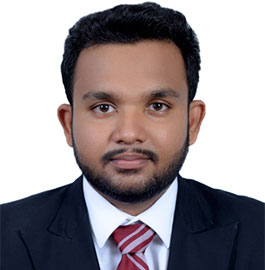
A.D.K.S.S. Somarathna
Research Assistant
Department of Agribusiness Management Wayamba University of Sri Lanka, Sri Lanka
A.D.K.S.S. Somarathna is currently working as a Research Assistant in the Department of Agribusiness Management, Faculty of Agriculture and Plantation Management, Wayamba University of Sri Lanka under the “National Thematic Research Program – Climate Change and Natural Disaster Project” funded by the National Science Foundation of Sri Lanka. Under this project they are conducting a research on Assessment of Spatial Impacts of Climate Change (Geographic, Economic and Social Vulnerability) on the Plantation Sector in Sri Lanka. He has also started his MPhil research study. The title of his MPhil research study is “Effect of Climate Change in Productivity in Coconut Plantation Sector in Sri Lanka”. The overall objective of his MPhil research is to assess the impact of Climate change on the coconut estate sector and find out the relevant adaptation strategies to mitigate the impact.
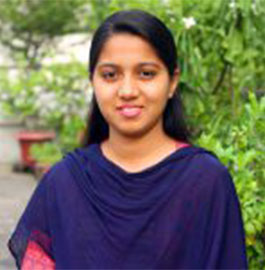
Nadeera Sultana
Research Associate
SANEM, Bangladesh
Nadeera Sultana is a Research Associate at South Asian Network on Economic Modeling (SANEM). She has completed her Bachelors and Masters in Economics from the faculty of Social Sciences, University of Dhaka. Her research interest lies in international trade, labour market, inclusive development etc. She has worked on a research paper on remittances and economic growth as a part of her graduation course.
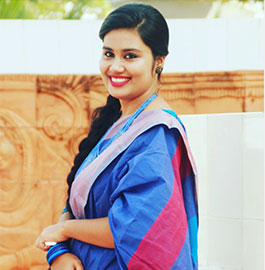
Tahrima Sultana
Department of Economics
Noakhali Science and Technology University, Bangladesh
Tahrima Sultana completed her both honour’s and master’s degree in Economics from Noakhali Science and Technology University. Her research area is interested in microeconomics, macroeconomics, labor economics, and development economics. She has good command over computer skills includes MS Office, Word, Excel, Power Point, SPSS, STATA, MATLAB, Eviews and Adobe Photoshop, Adobe Illustrator, Adobe In Design.
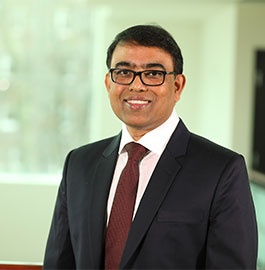
Dr. Bidyut Talukdar
Associate Professor
Department of Economics
Saint Mary’s University, Canada
Dr. Bidyut Talukdar is associate professor of economics in the Sobey School of Business at Saint Mary’s University in Halifax, Canada. He received his Ph.D. in economics from McMaster University in 2011. Before moving to Canada, he served as assistant professor of economics at Shahjalal University of Science & Technology in Sylhet, Bangladesh. Dr. Talukdar is a macroeconomist and his research focuses on optimal fiscal and monetary policy, dynamic macro-environmental general equilibrium modelling, and international finance. He has published research articles in refereed international journals such as The B. E. Journal of Macroeconomics, Economic Modelling, Journal of Economic Asymmetries, International Review of Applied Economics, Economics Bulletin, and Australian Economic Papers.
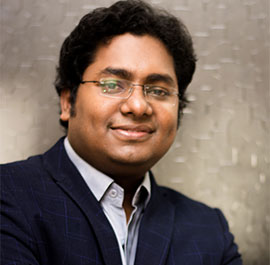
Mahtab Uddin
Lecturer
Lecturer, Department of Economics
University of Dhaka, Bangladesh
Mahtab Uddin is currently working as a lecturer at Department of Economics, University of Dhaka. His research interest includes microeconomics, labour economics, development economics and international trade. He obtained his BSS and MSS from Department of Economics, University of Dhaka. He was awarded with Shah A. M. S. Kibria Gold Medal, 2014 by the President of the Peoples’ Republic of Bangladesh for obtaining the highest CGPA in M.S.S. in Economics from the University of Dhaka for the year of 2014, M. N. Huda Gold Medal, 2013 by the President of the Peoples’ Republic of Bangladesh for obtaining the highest CGPA in B.S.S. in Economics from the University of Dhaka for the year of 2013 and received Dean’s award for obtaining the highest CGPA in BSS in Economics by the Dean of Social Sciences, University of Dhaka for the year 2013.
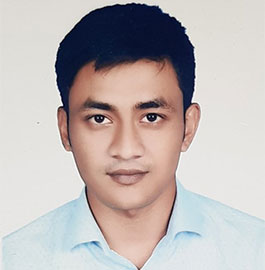
Salman Ibn Yasin
Master’s Student
Department of Economics
Pabna University of Science and Technology, Bangladesh
Salman Ibn Yasin is a student of Department of Economics at Pabna University of Science and Technology. He completed his BSS in Economics from Pabna University of Science and Technology.
